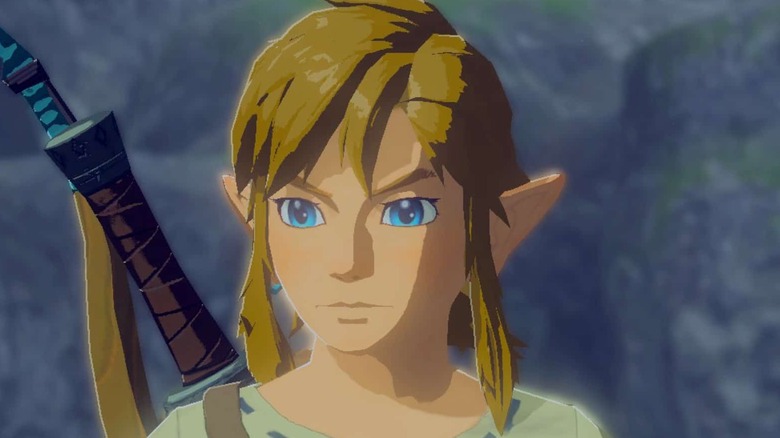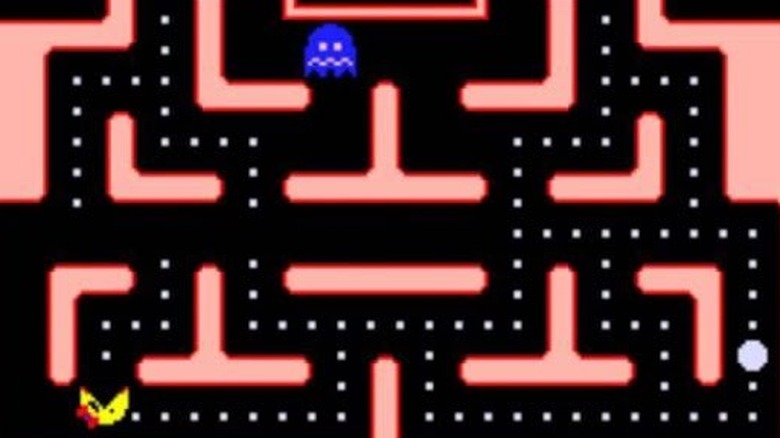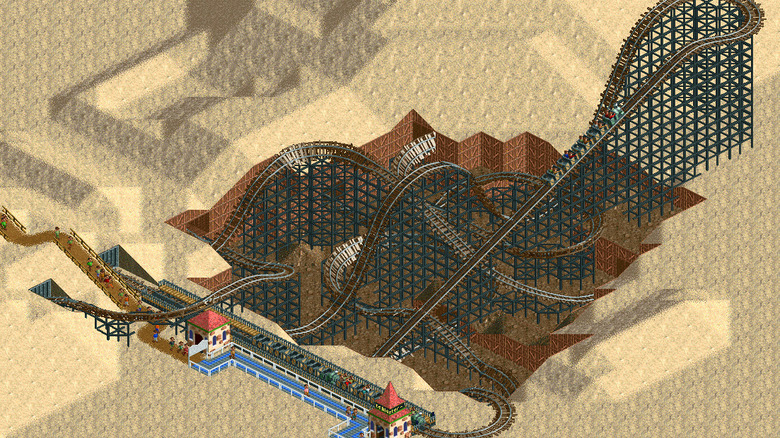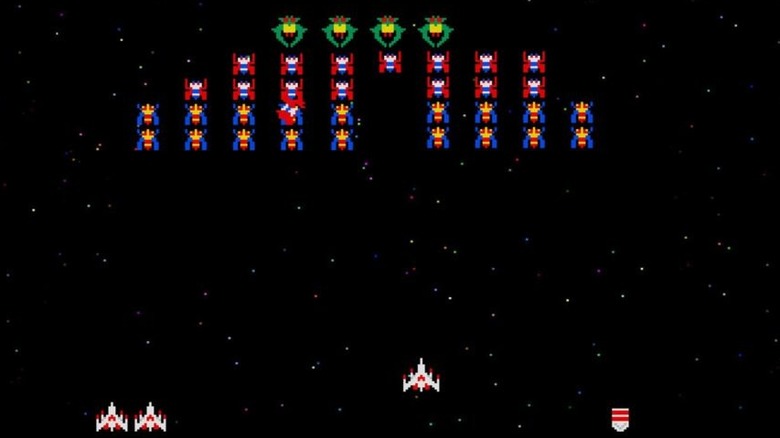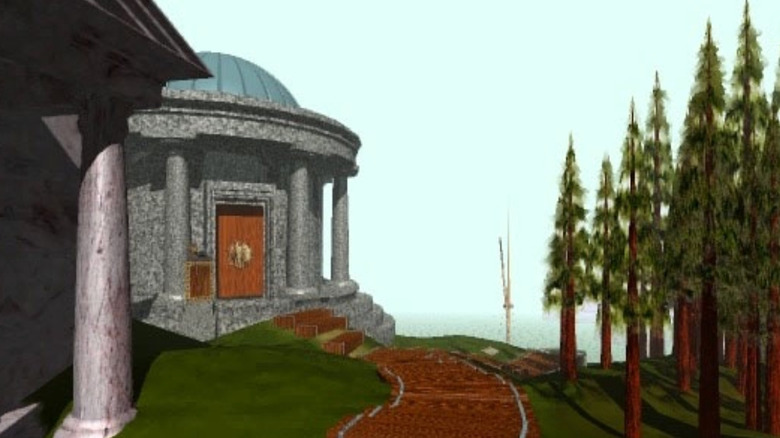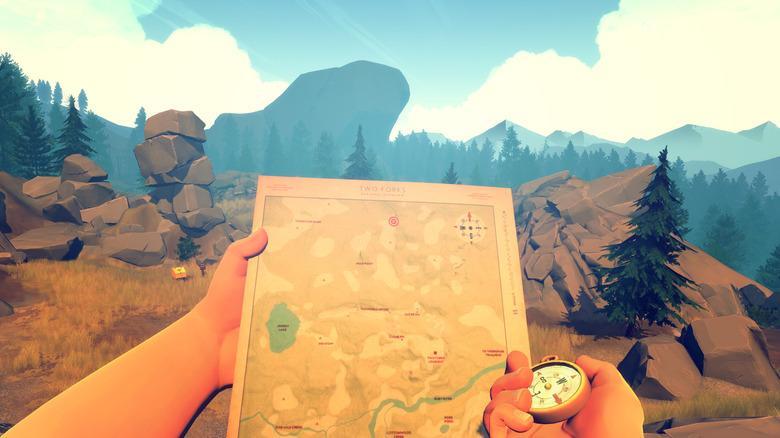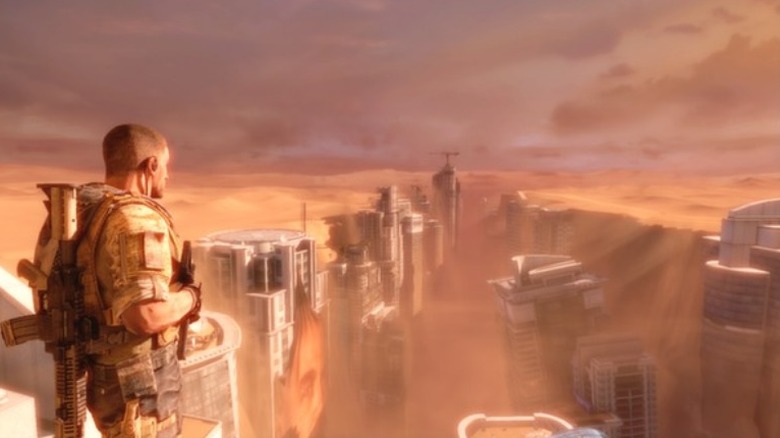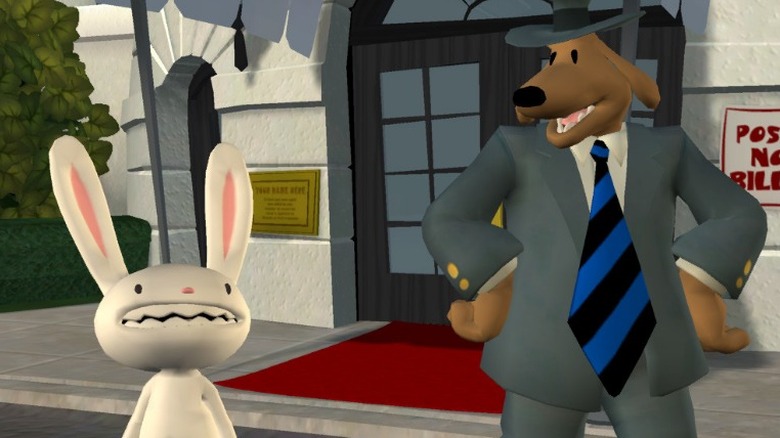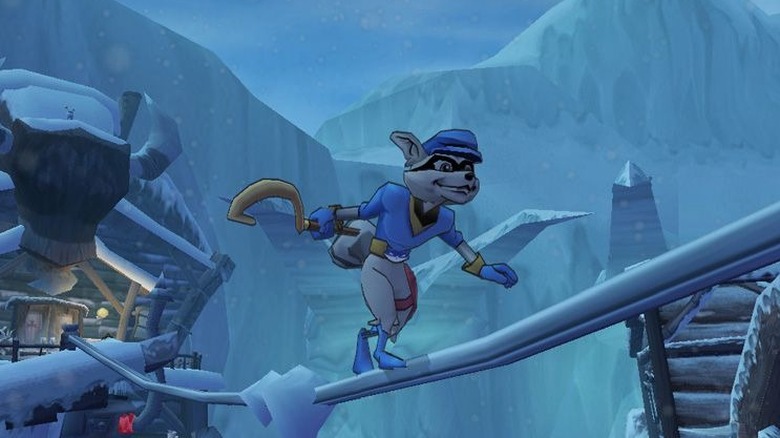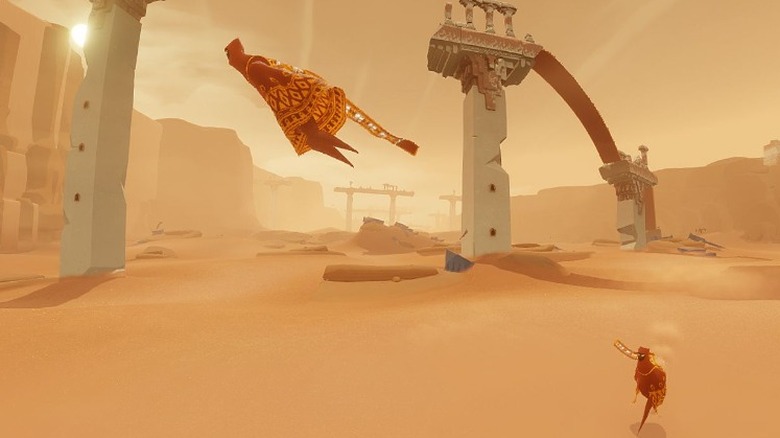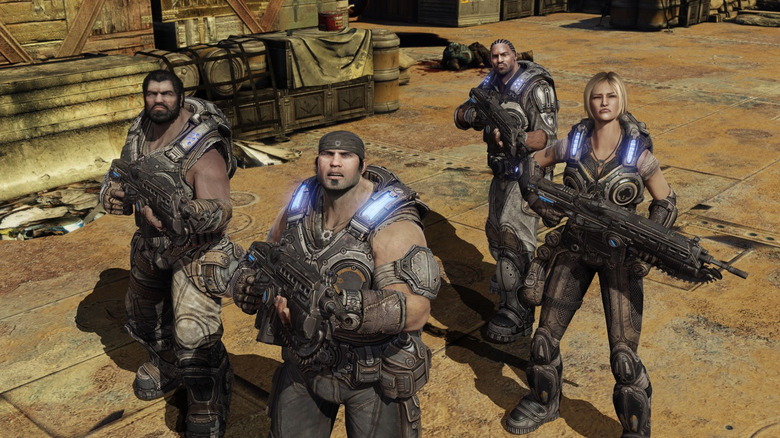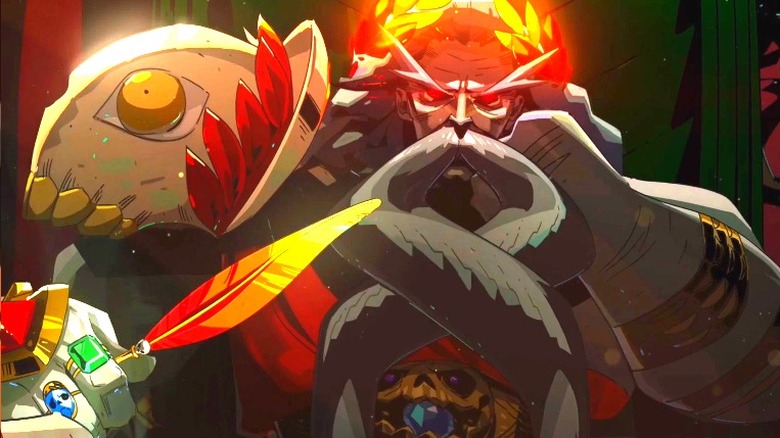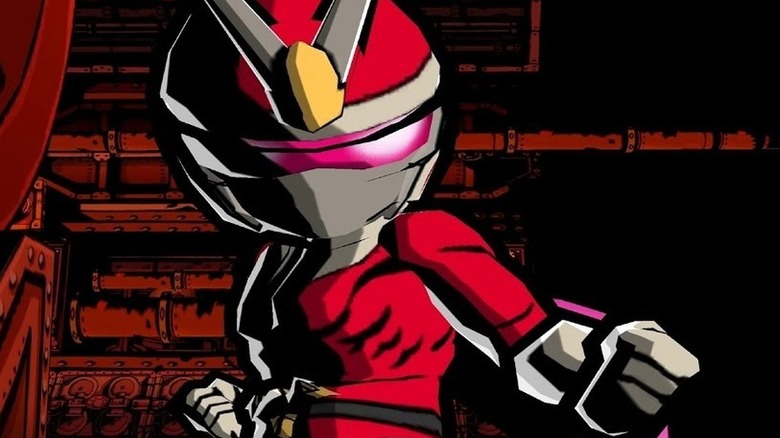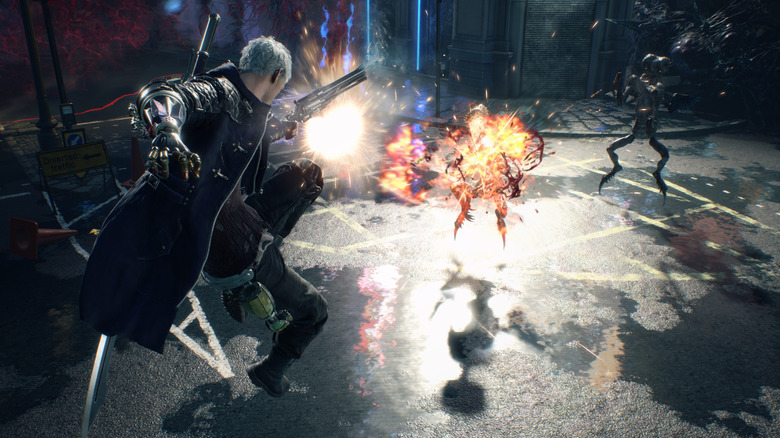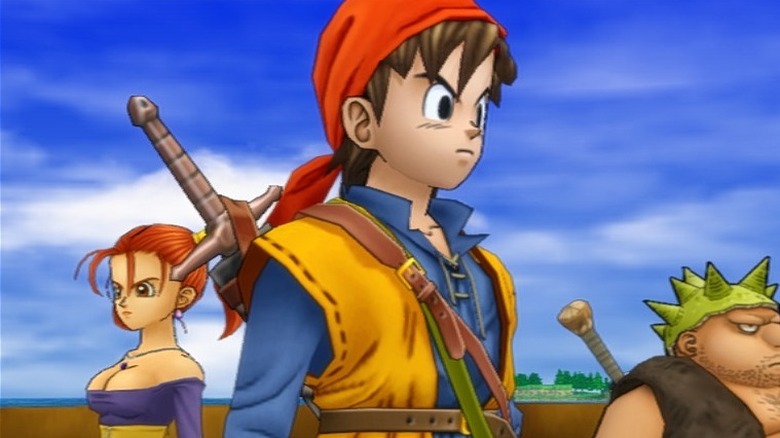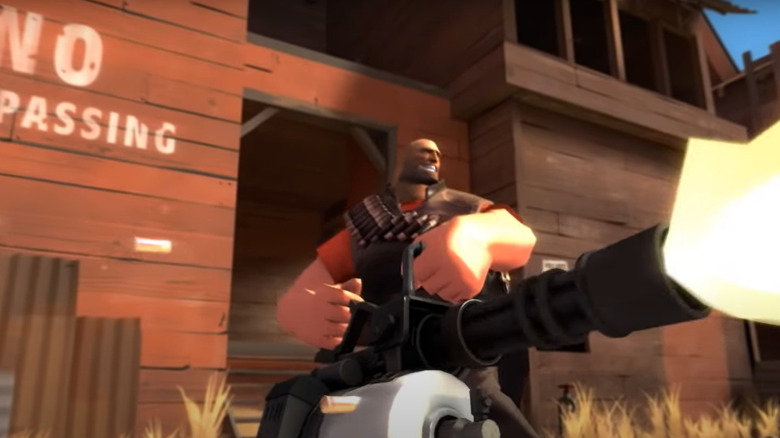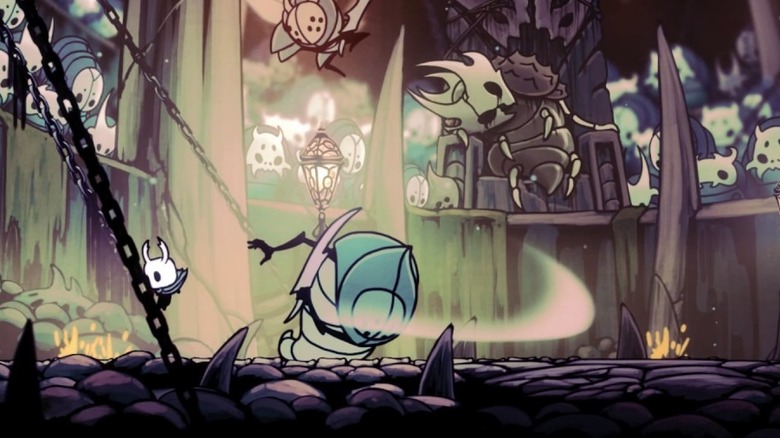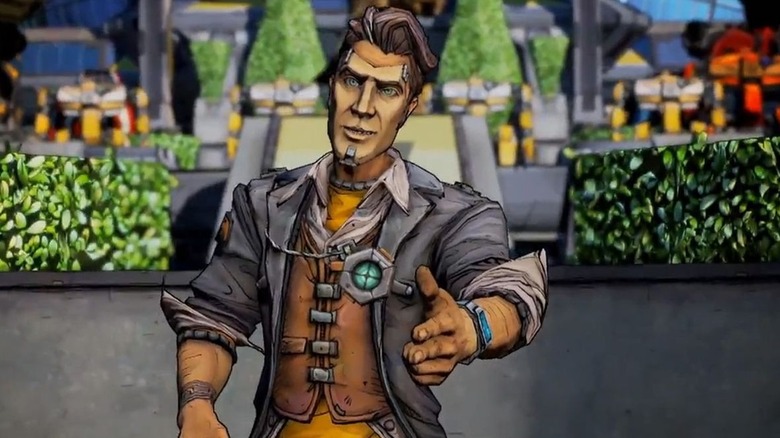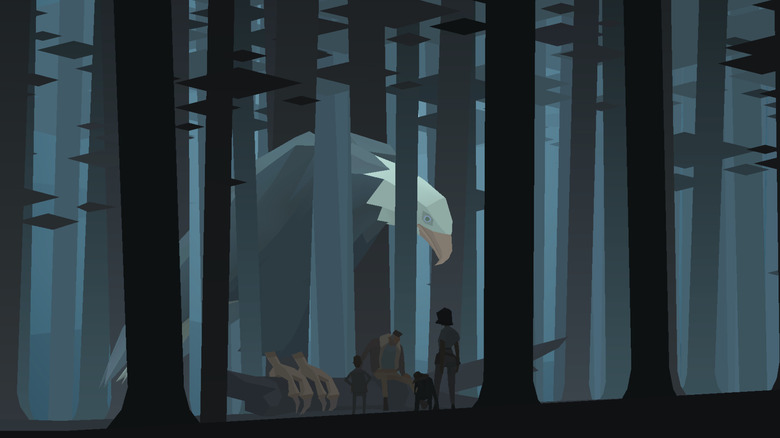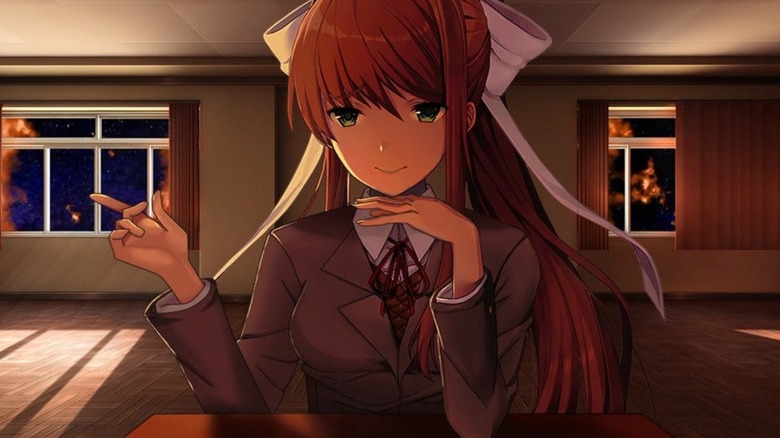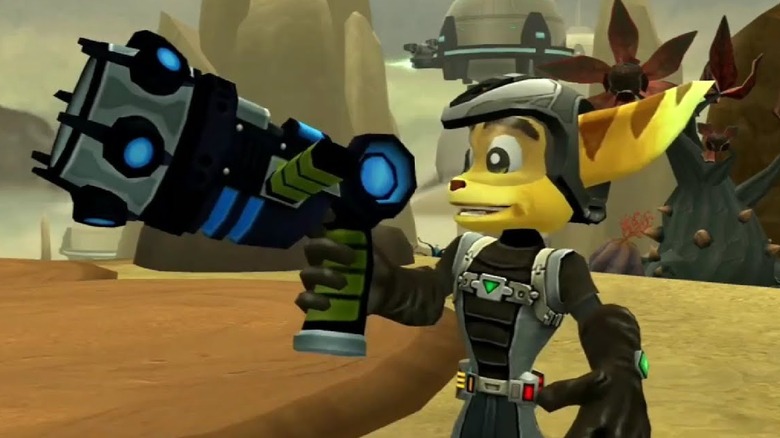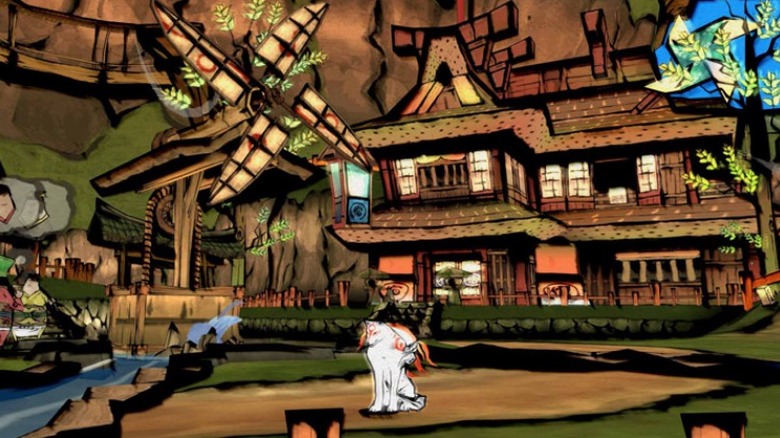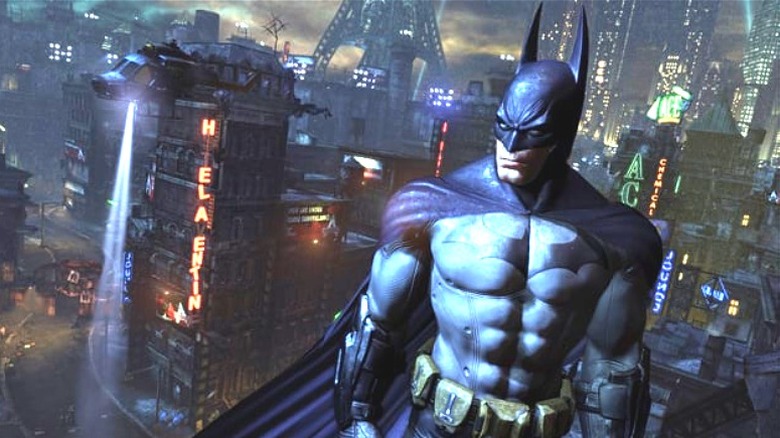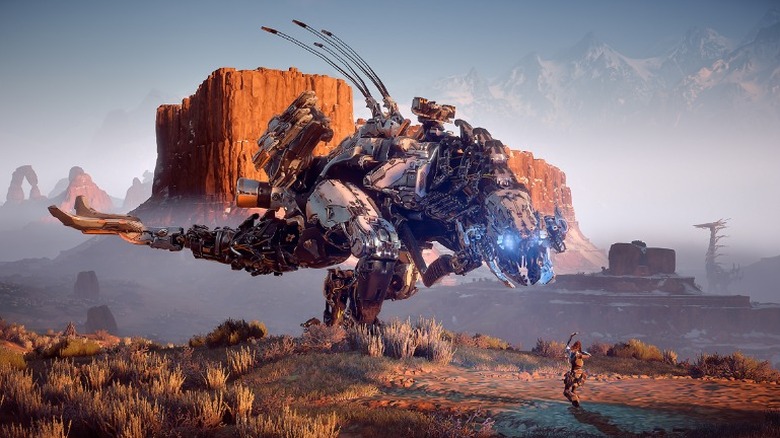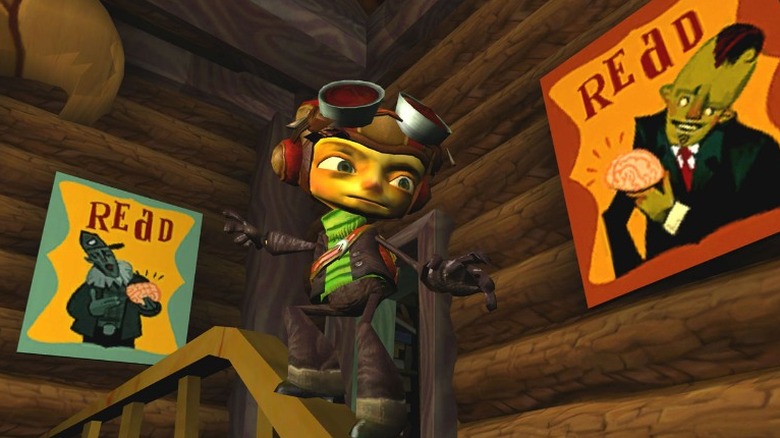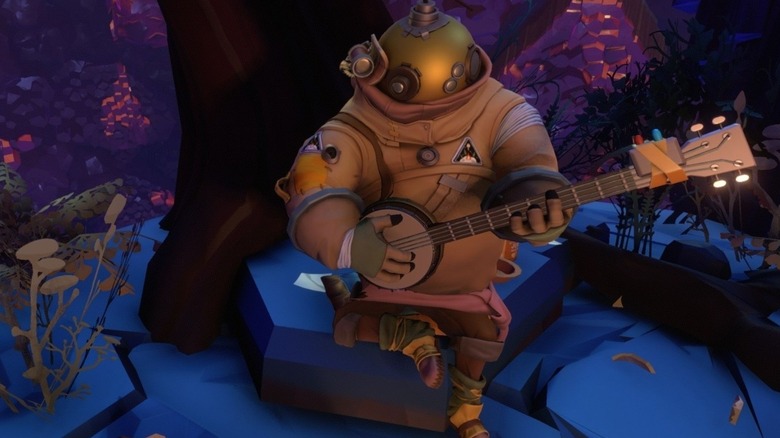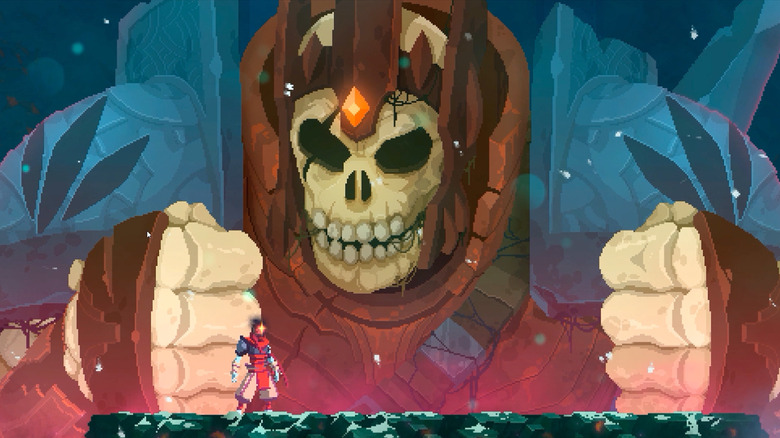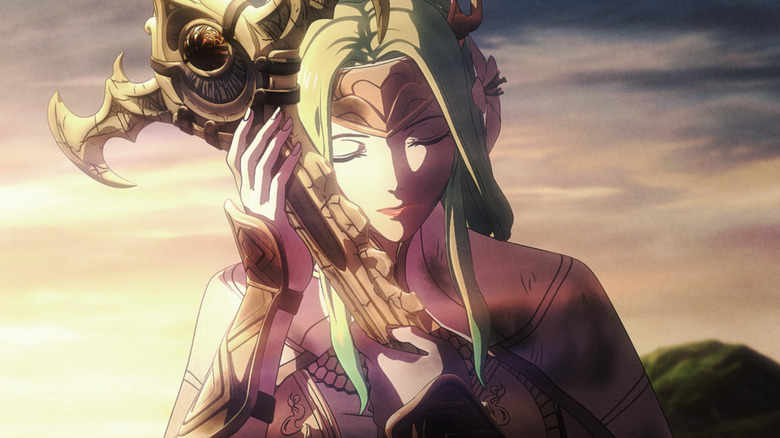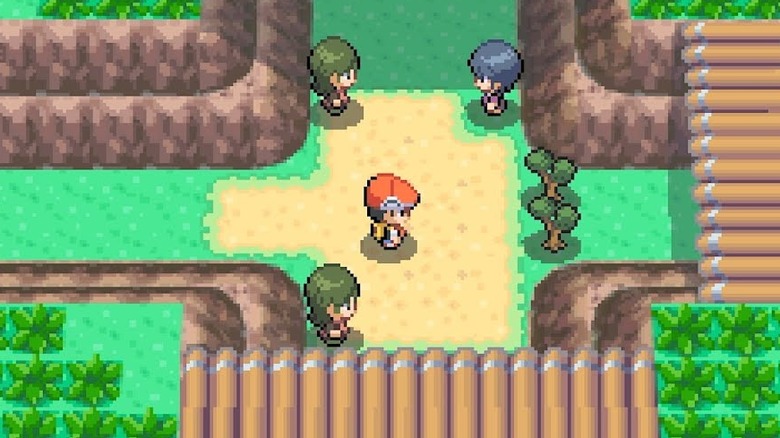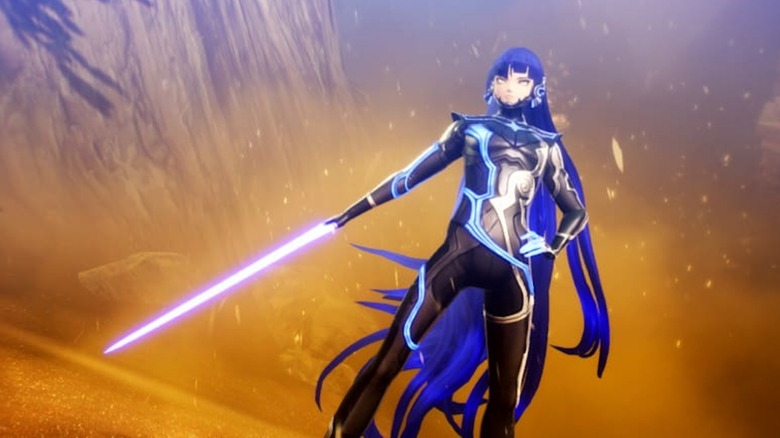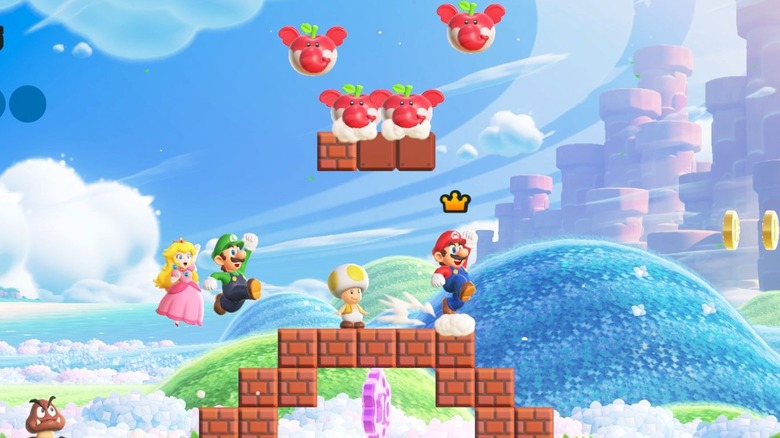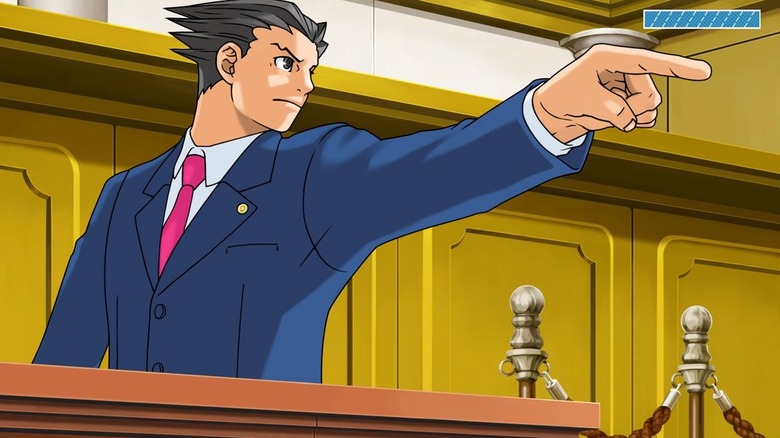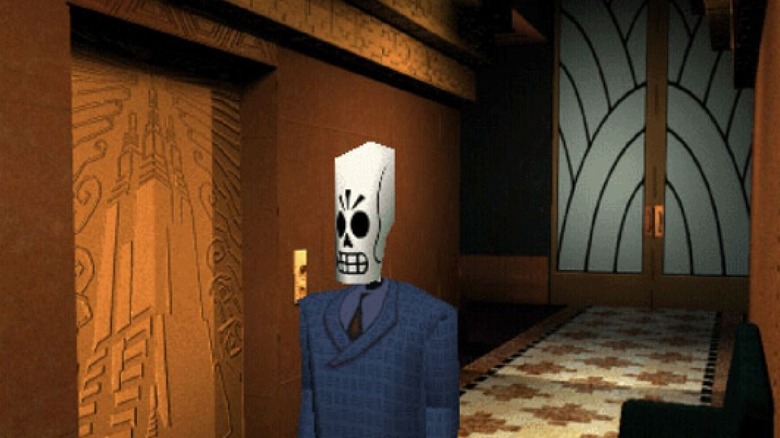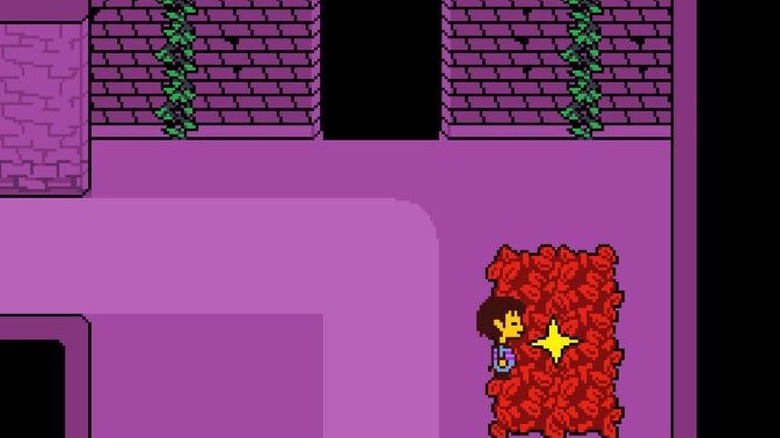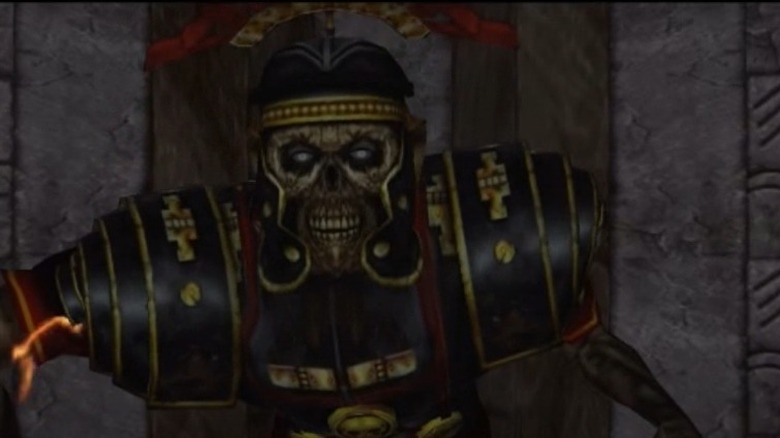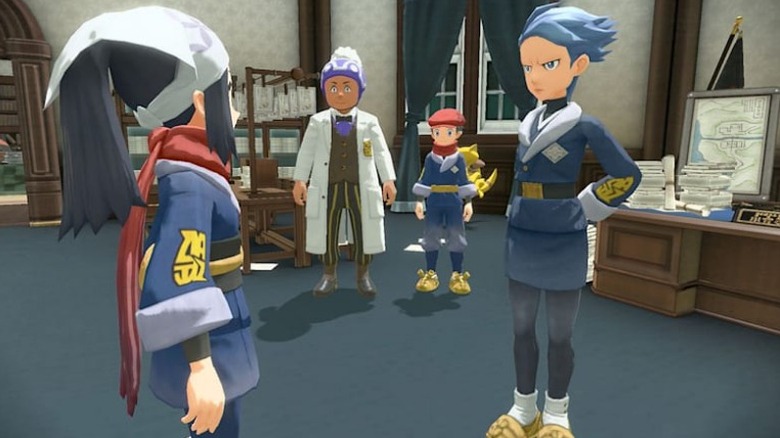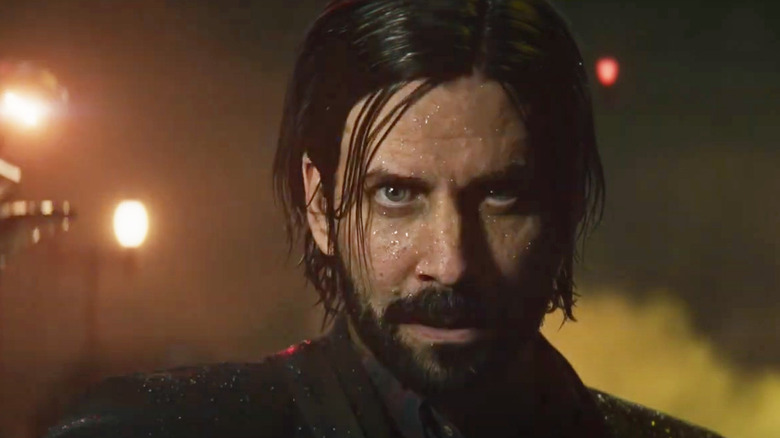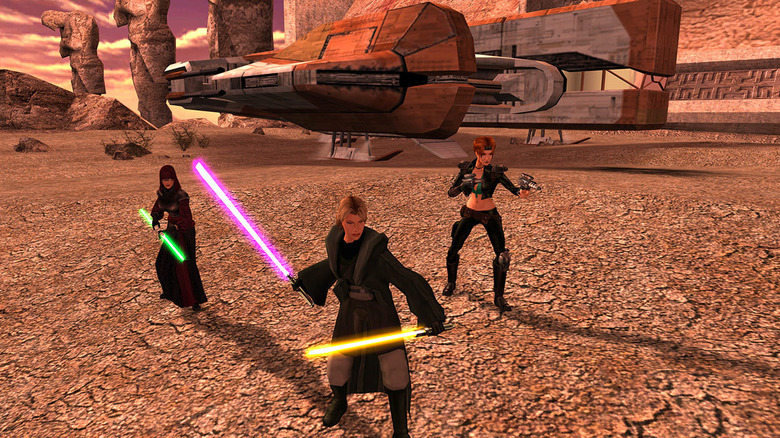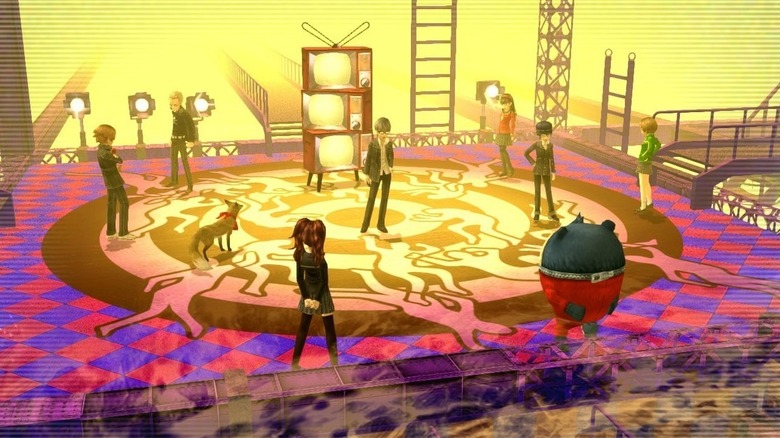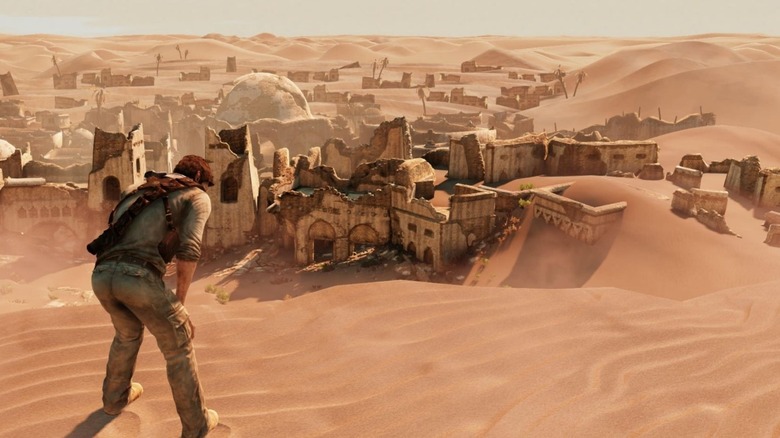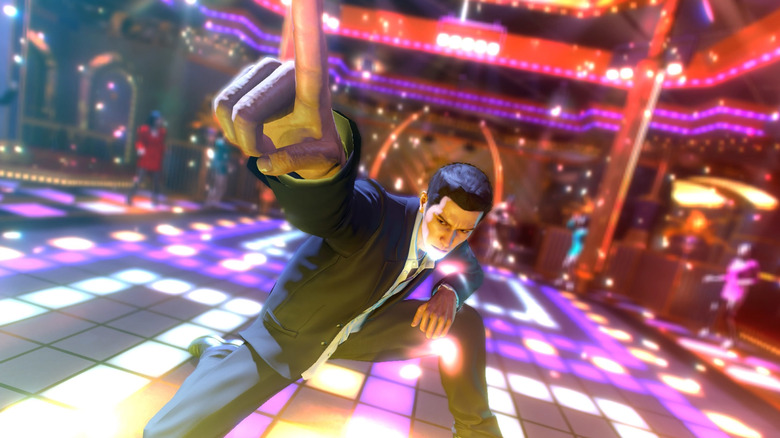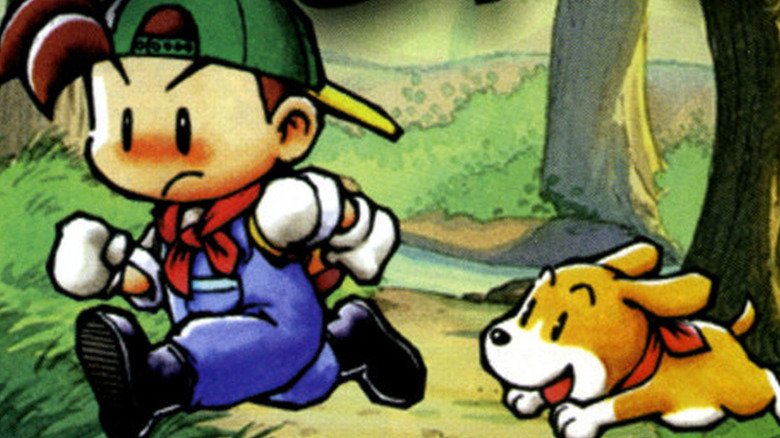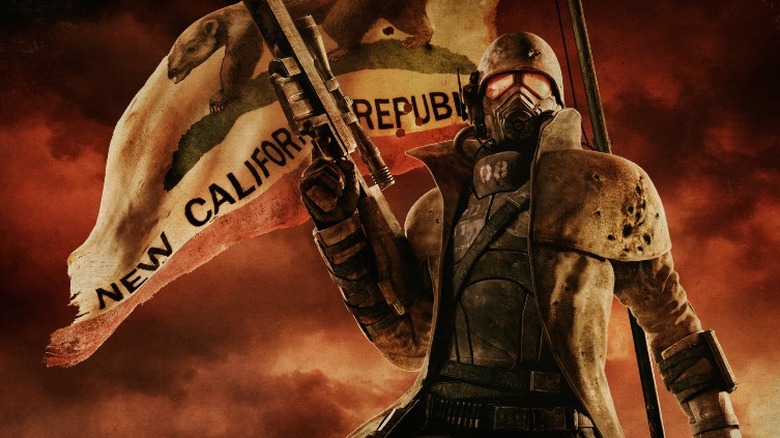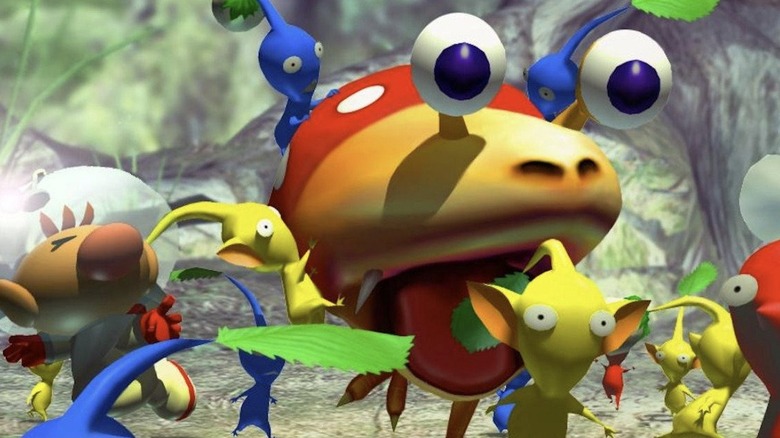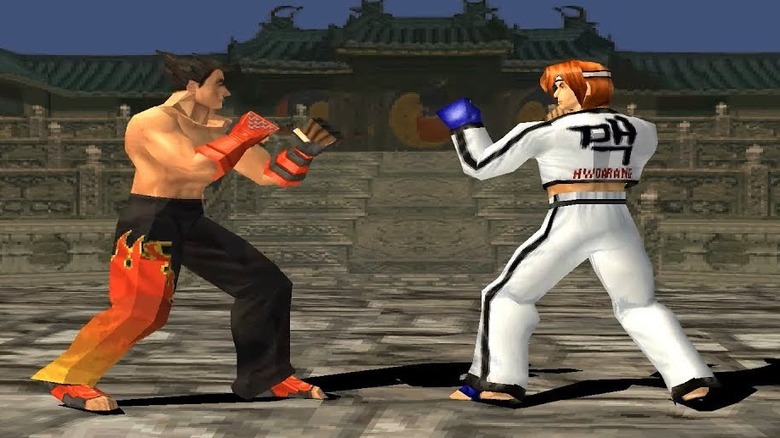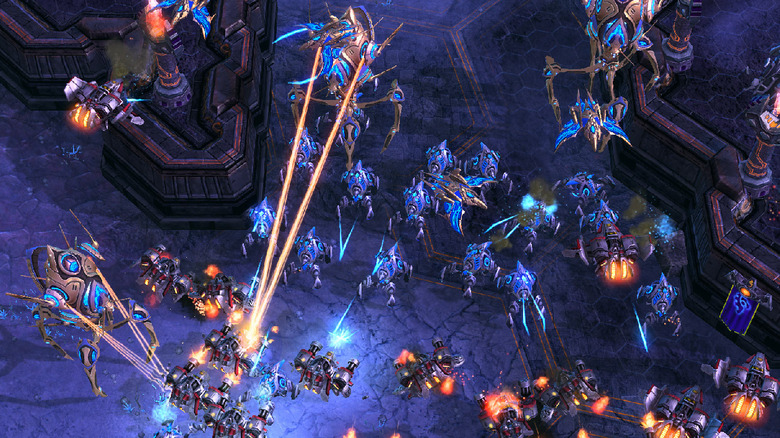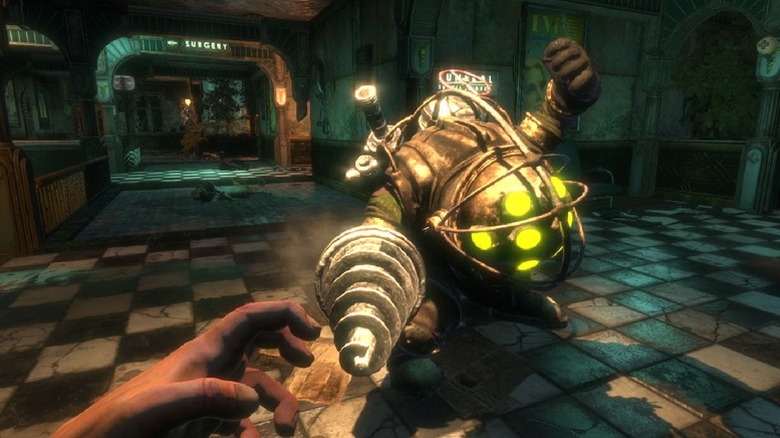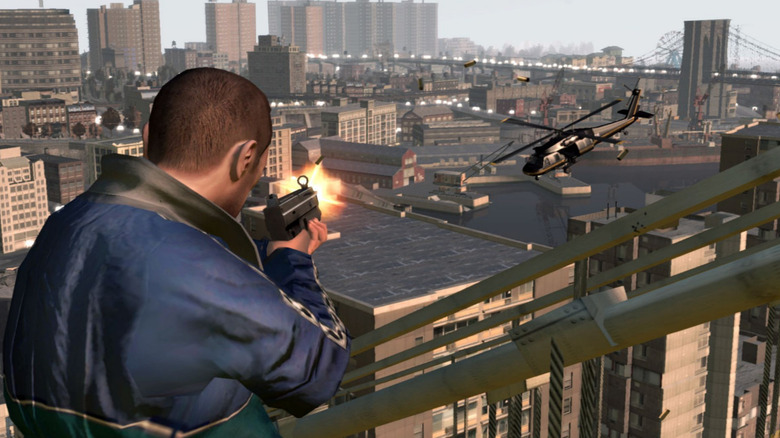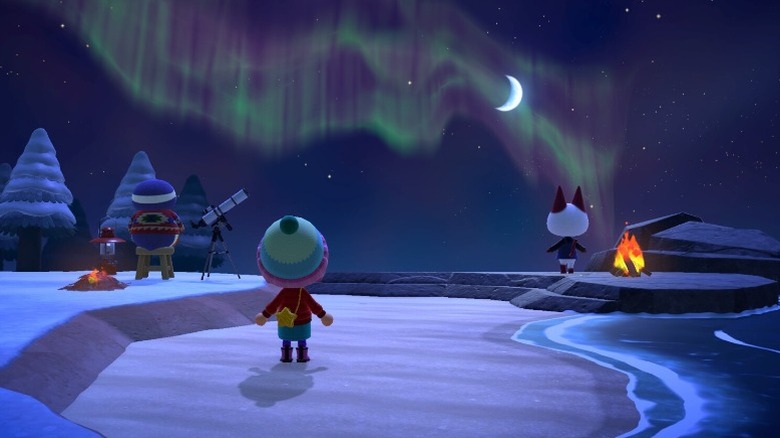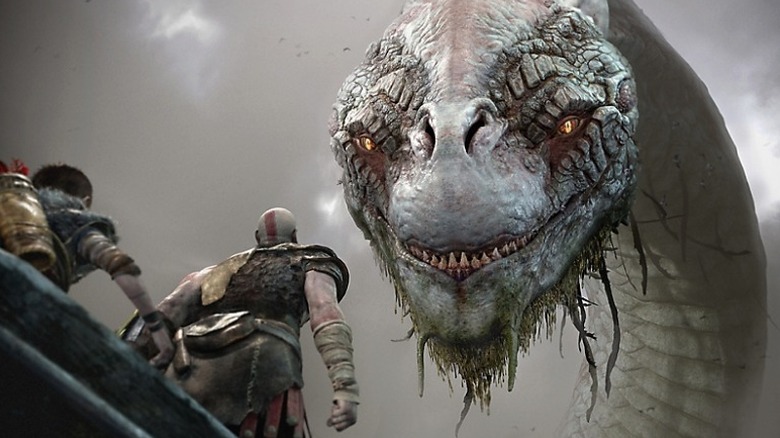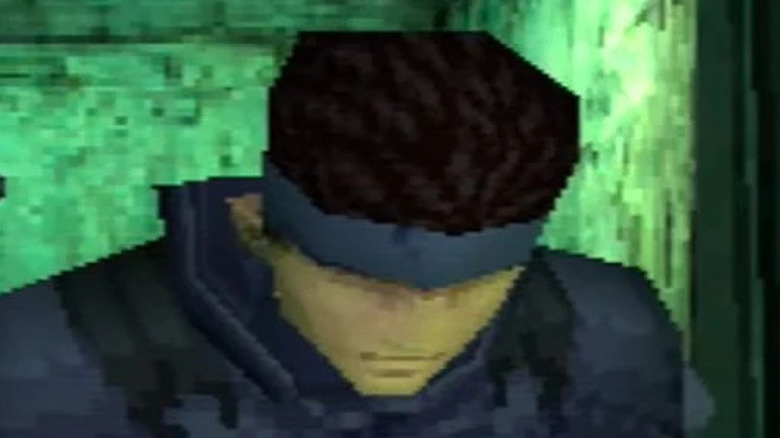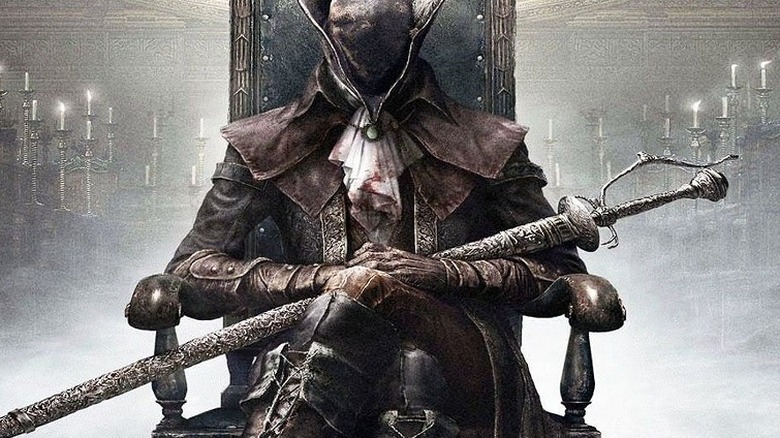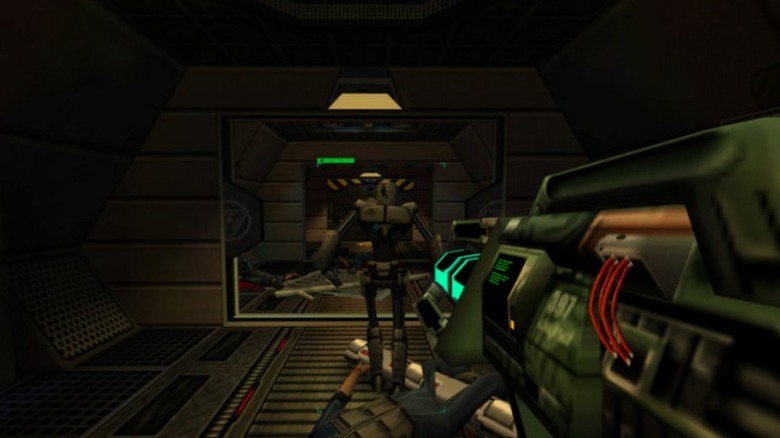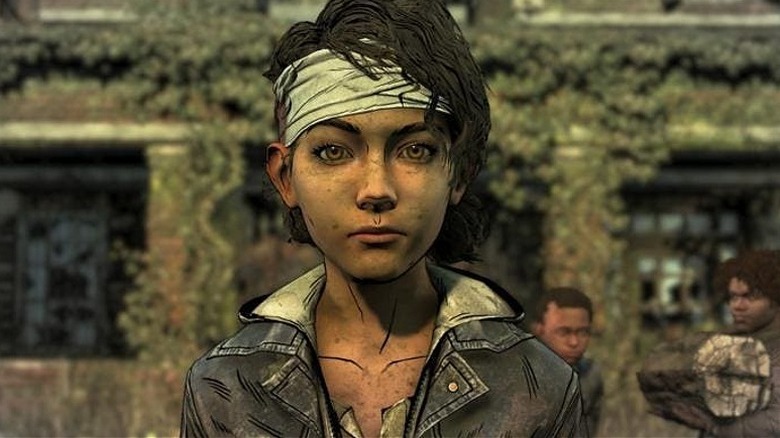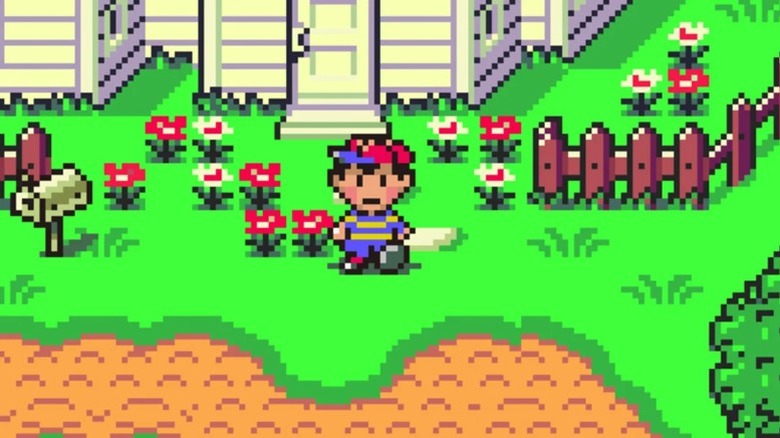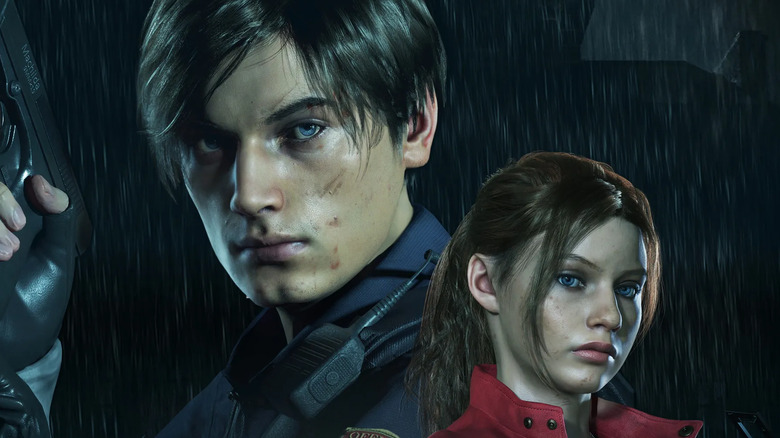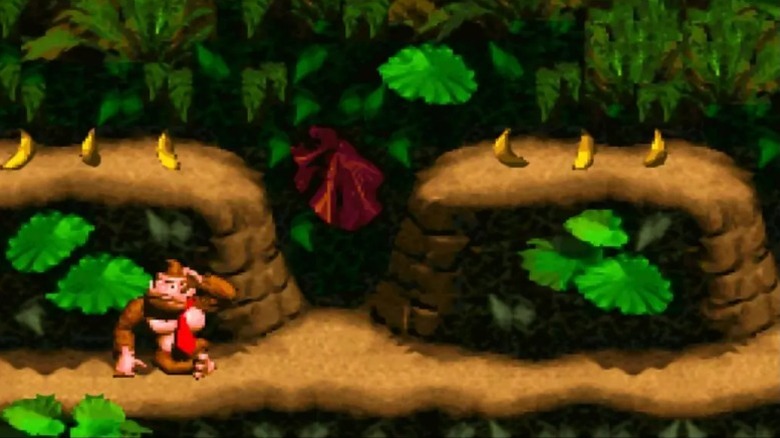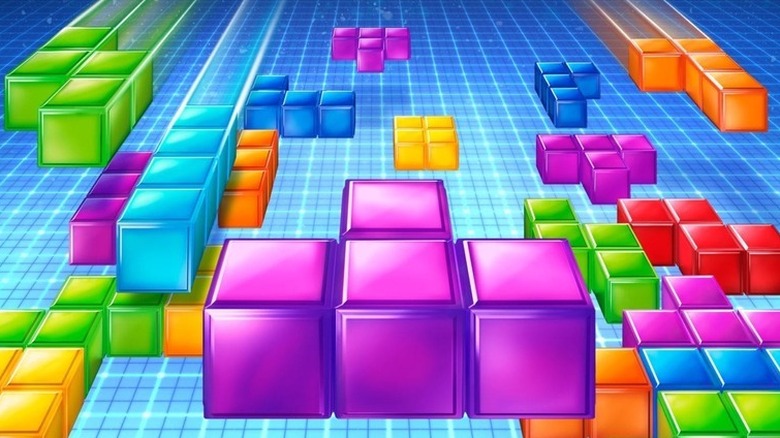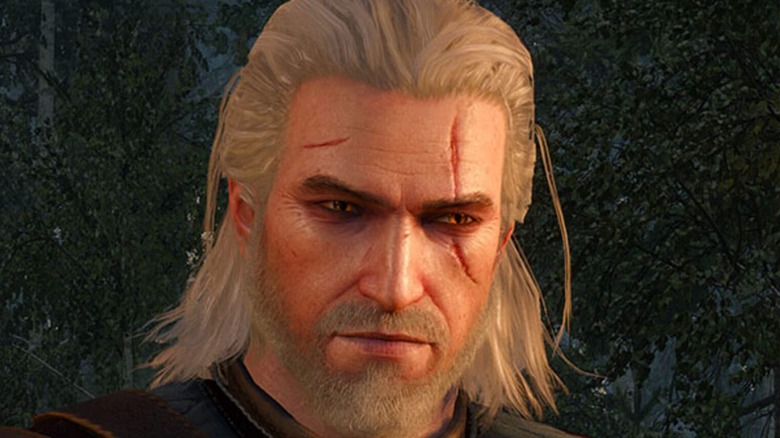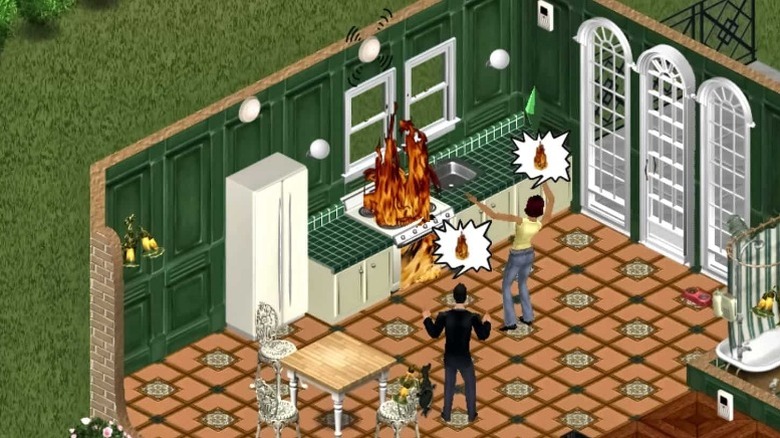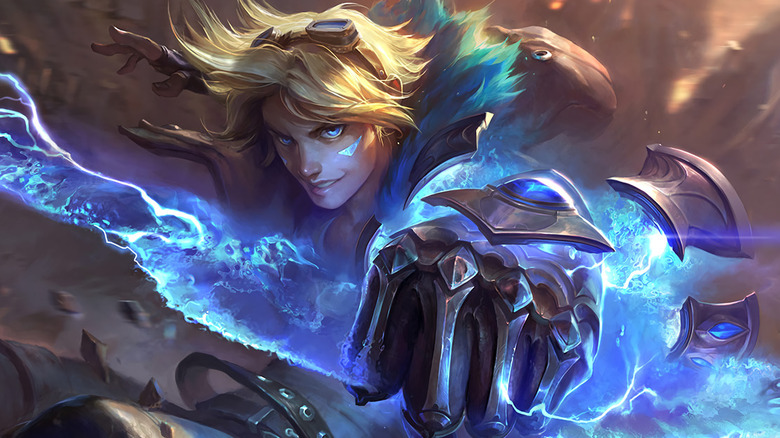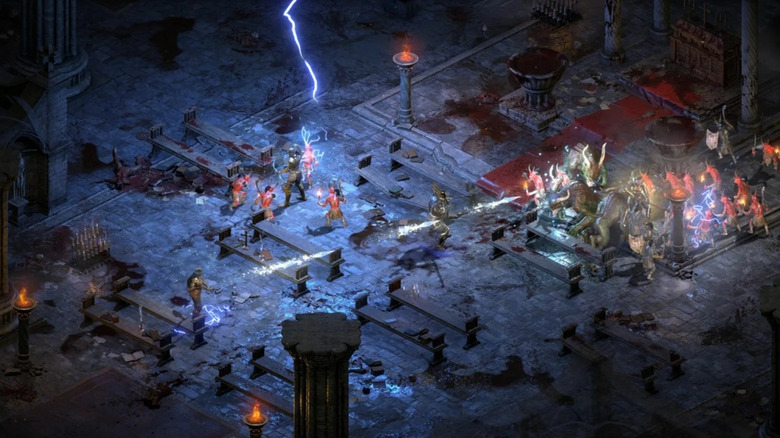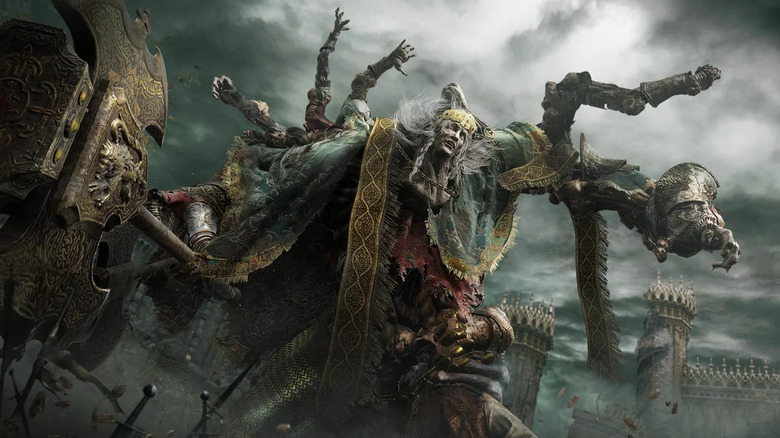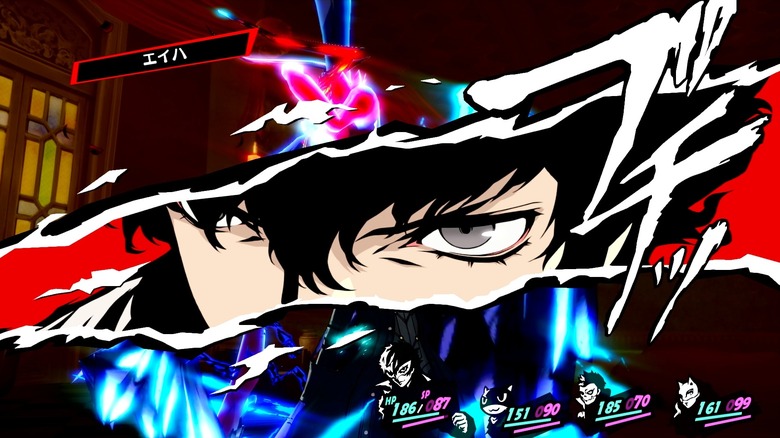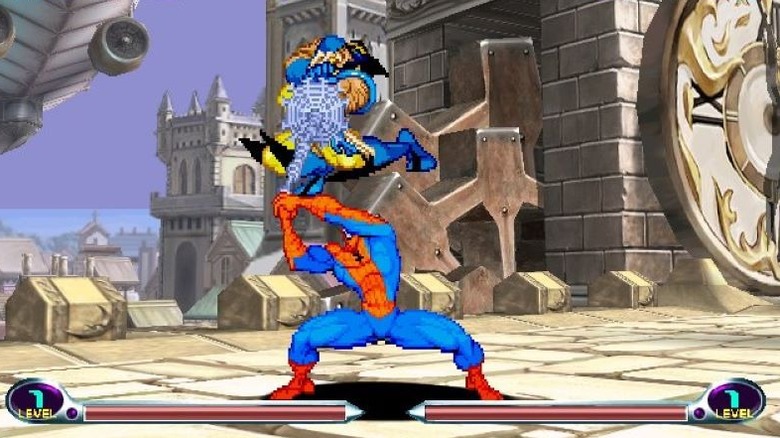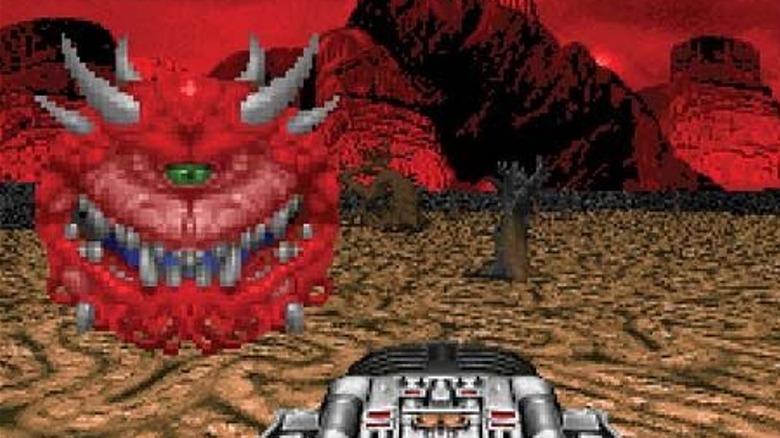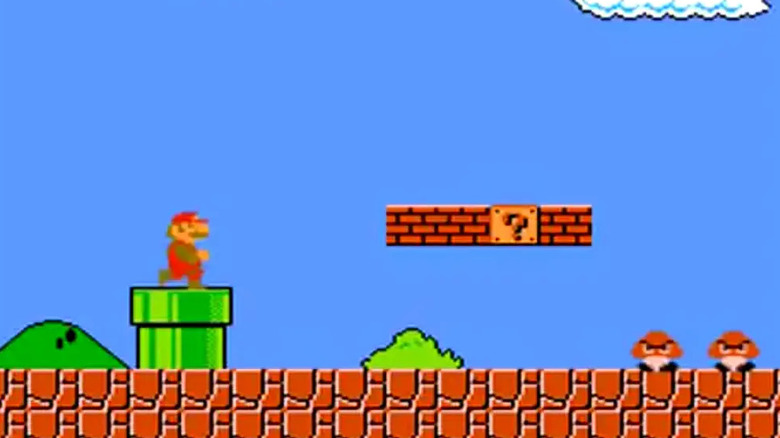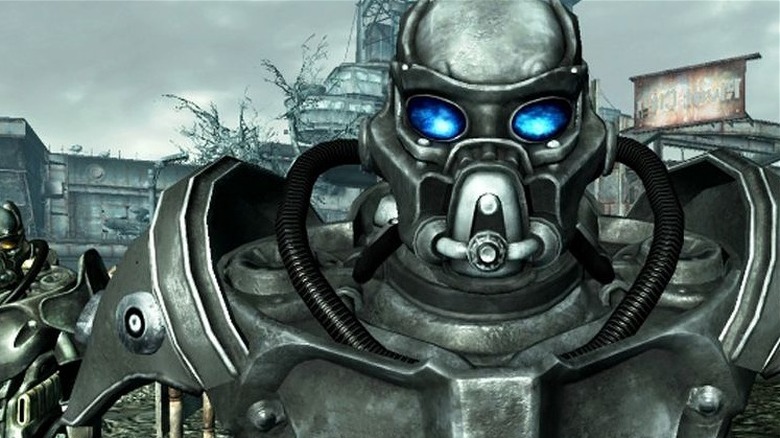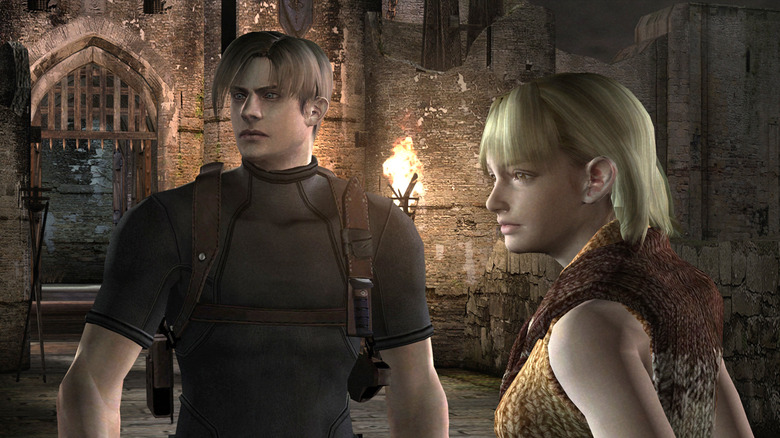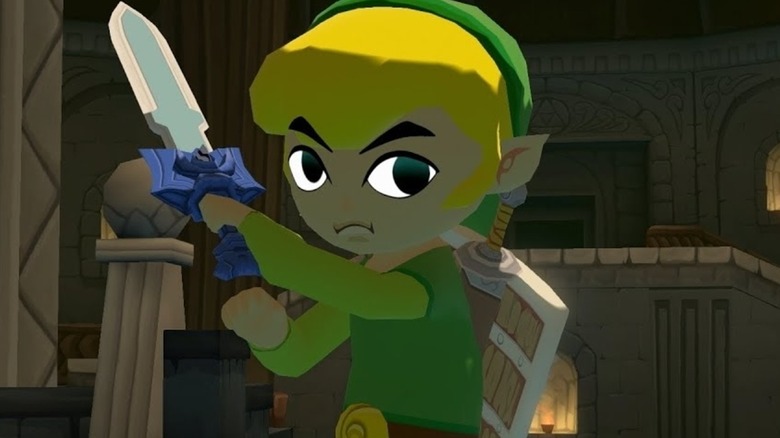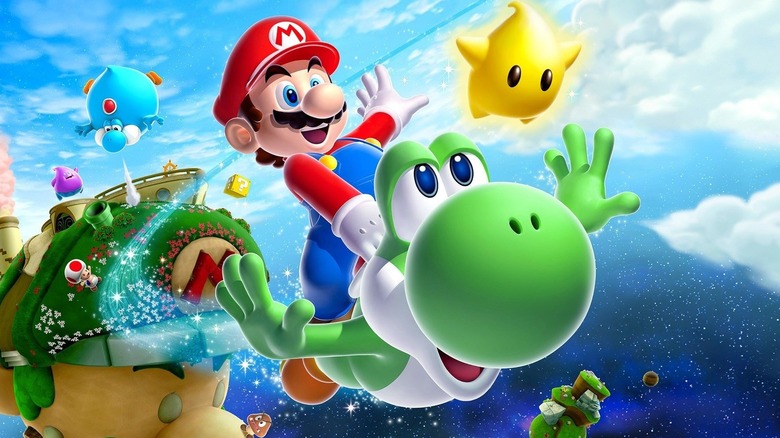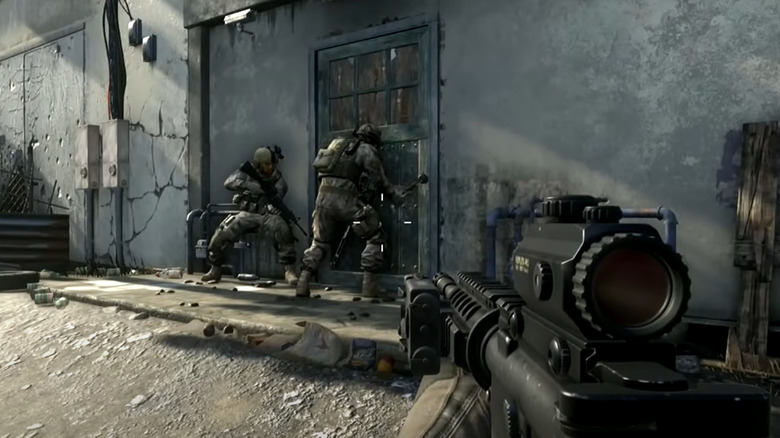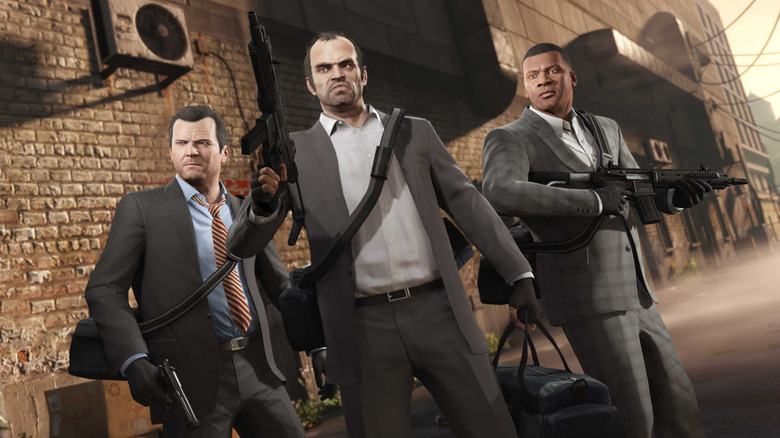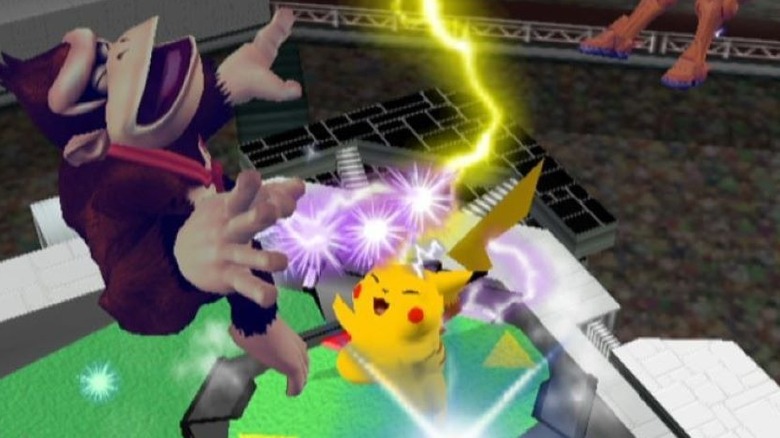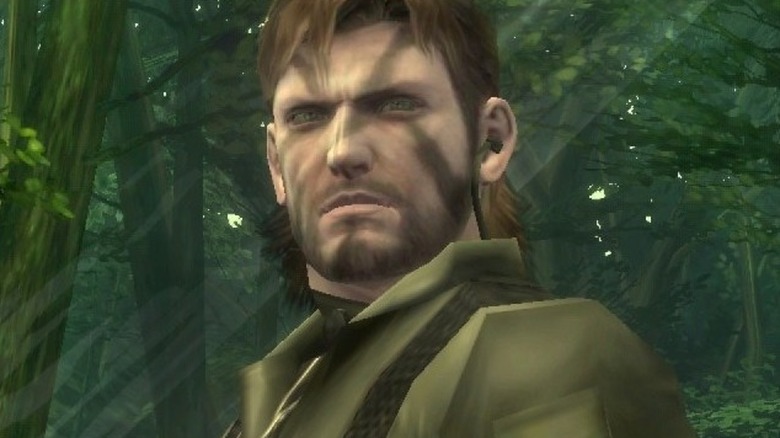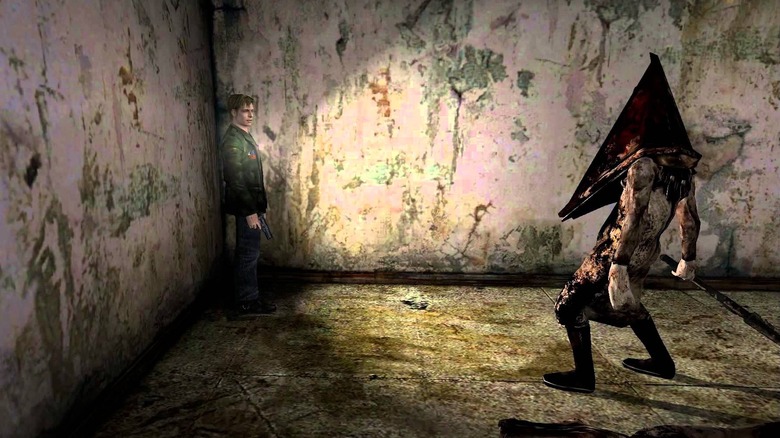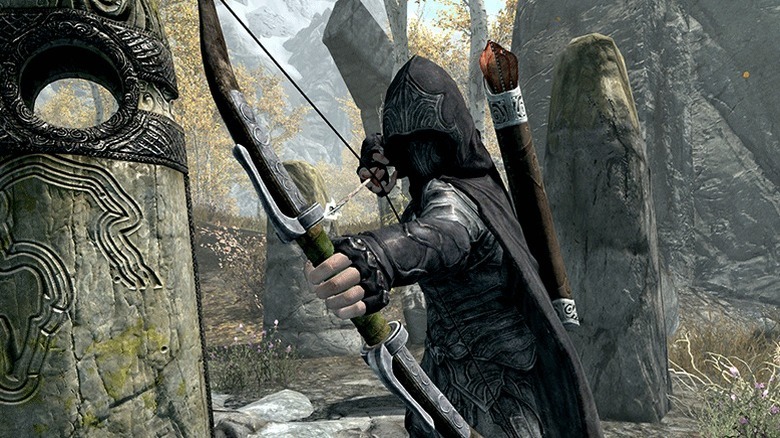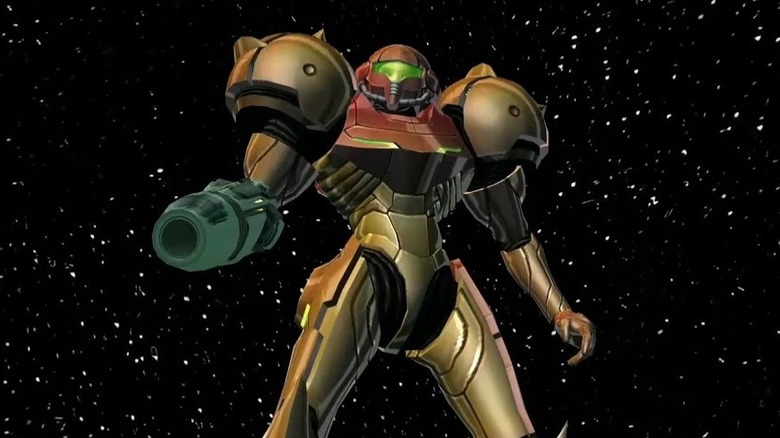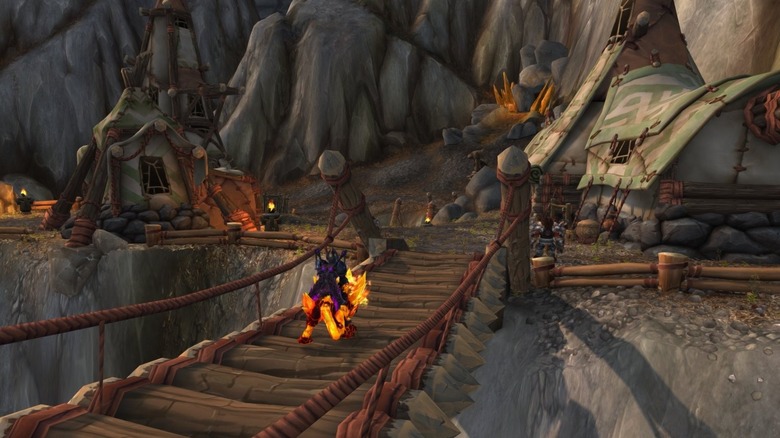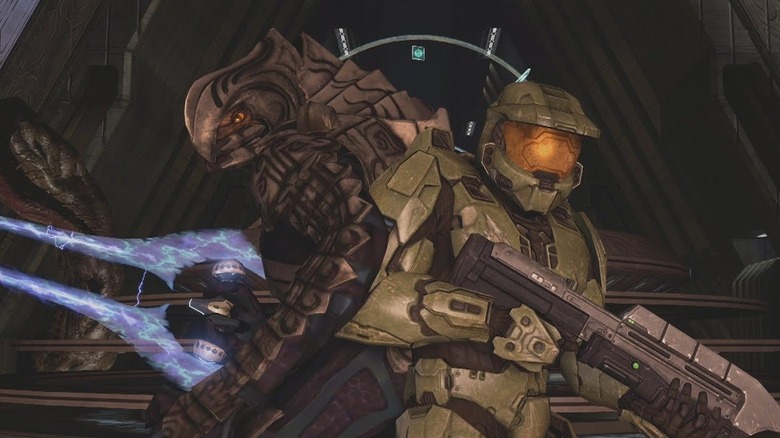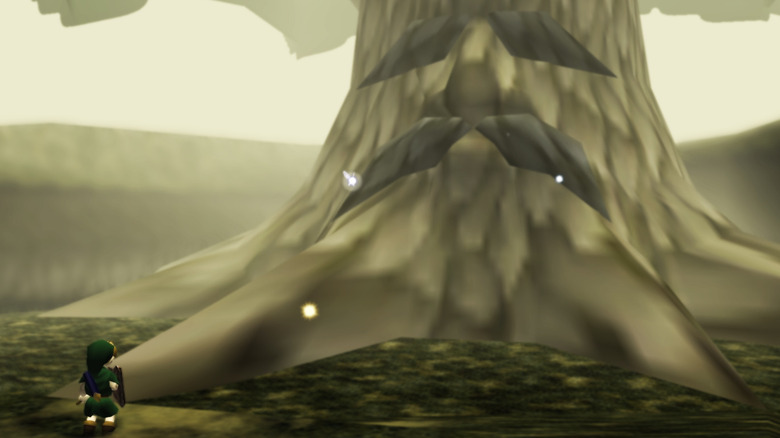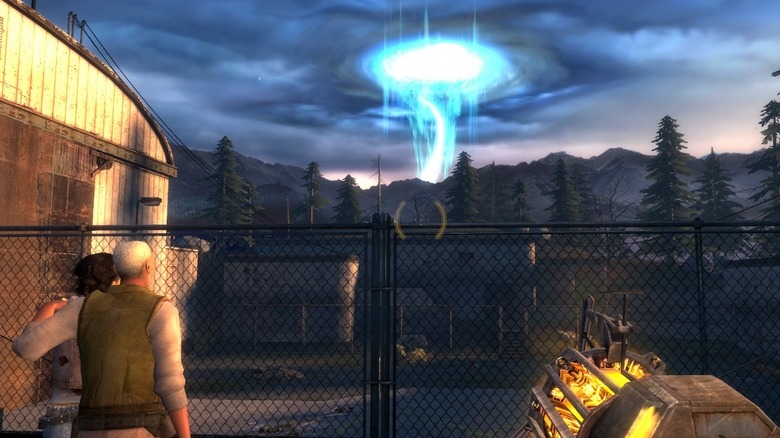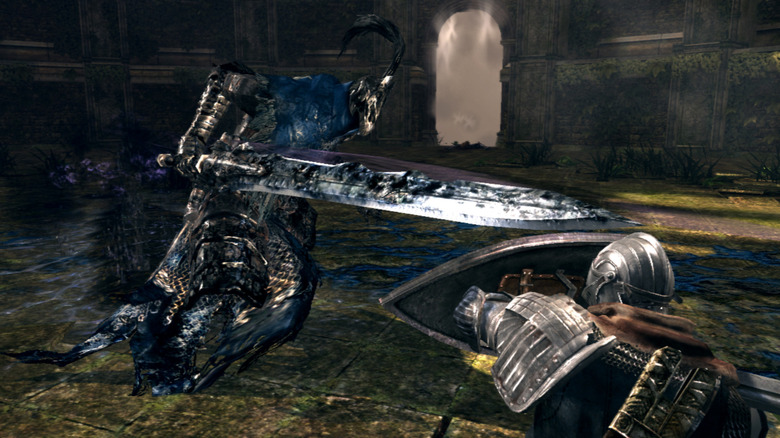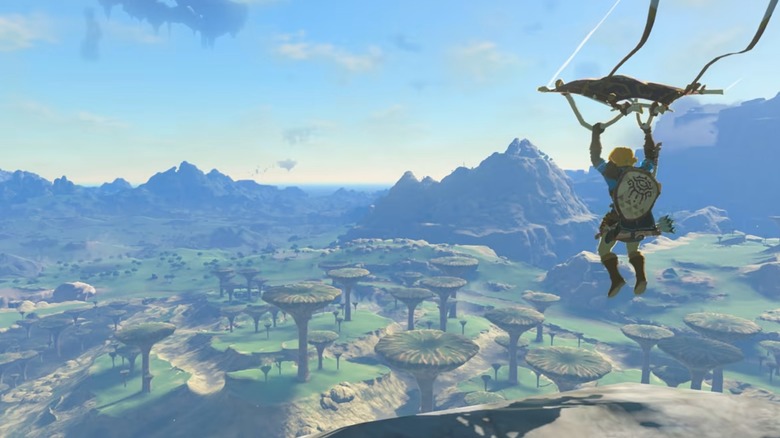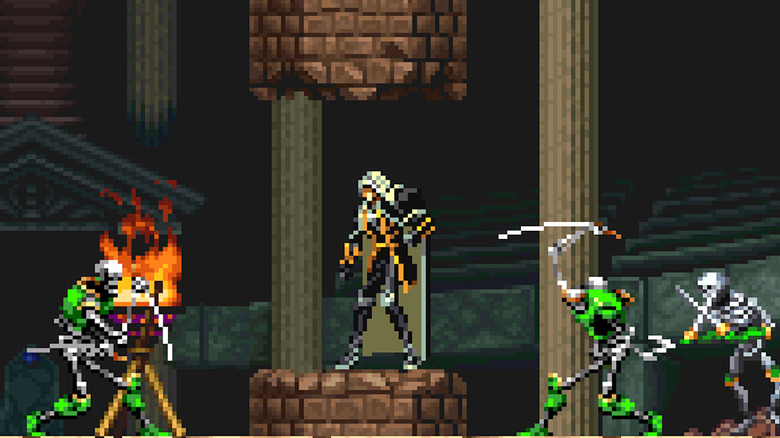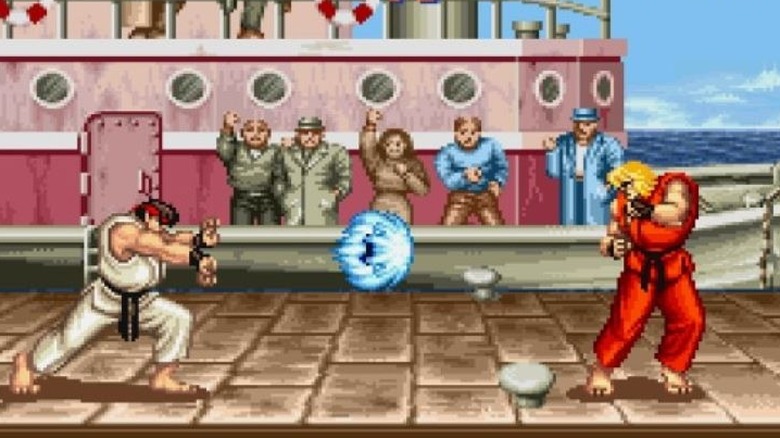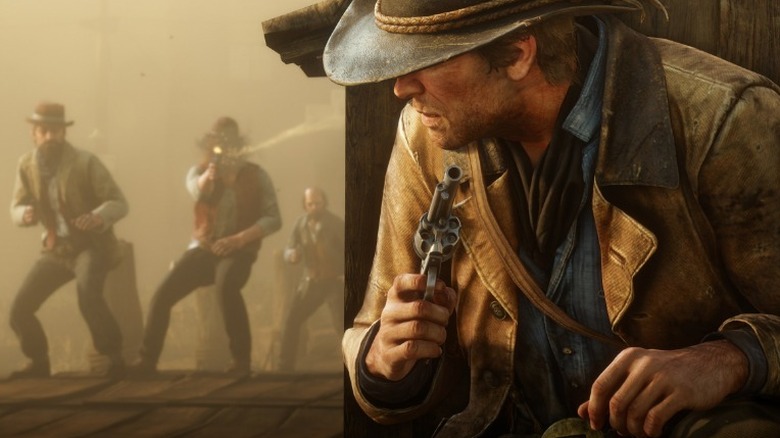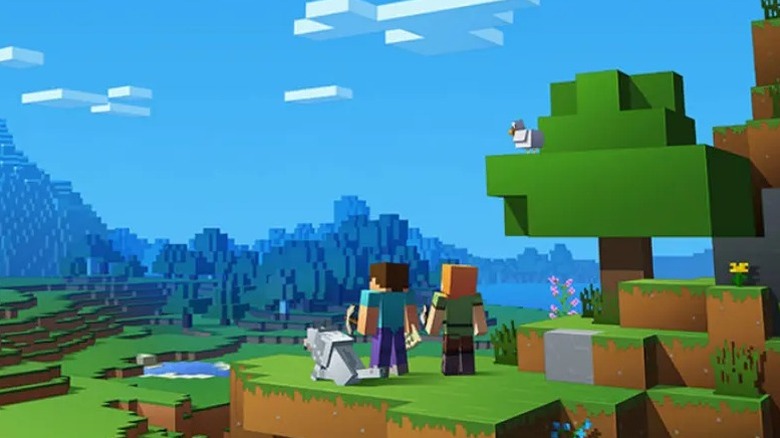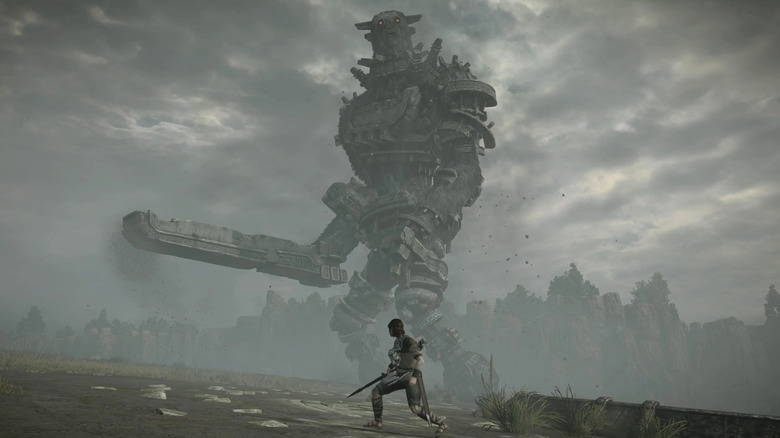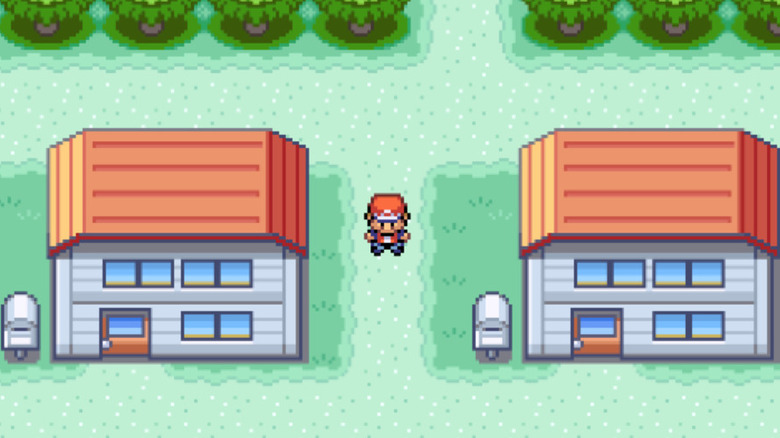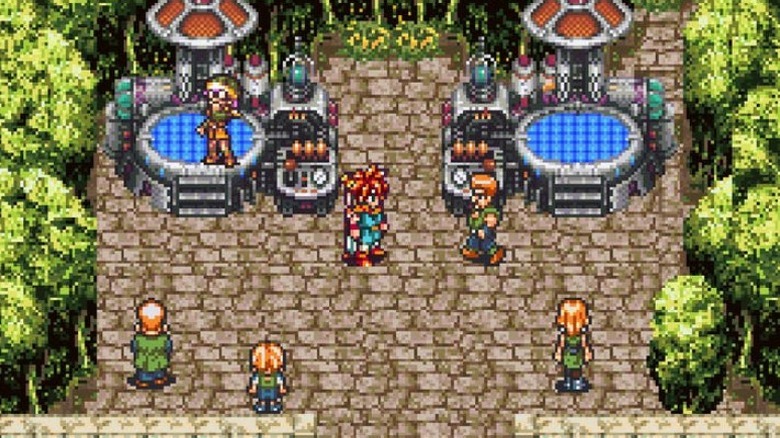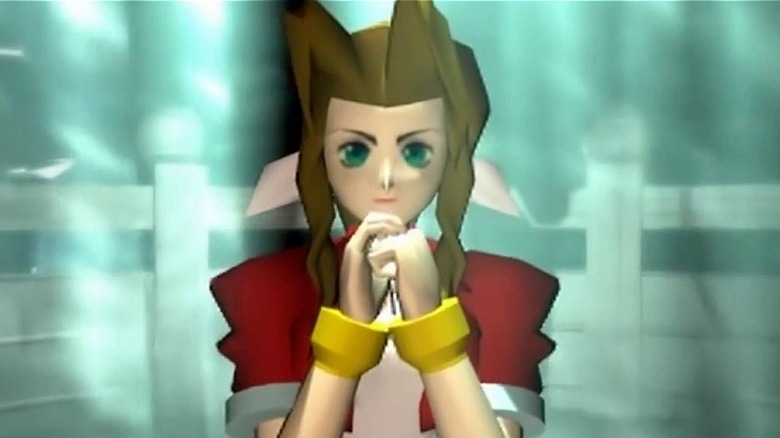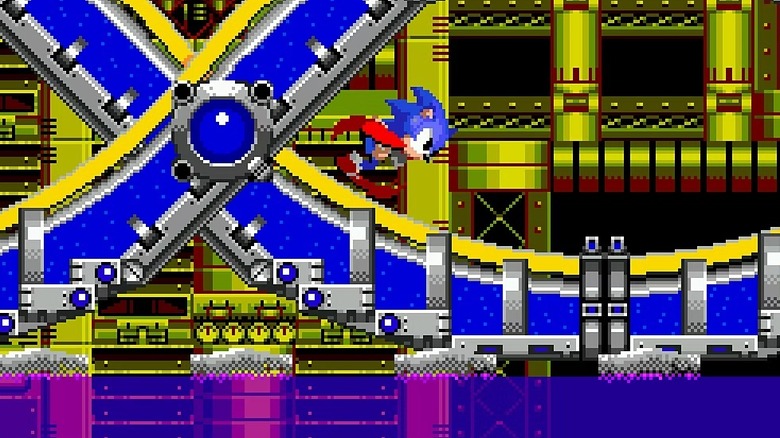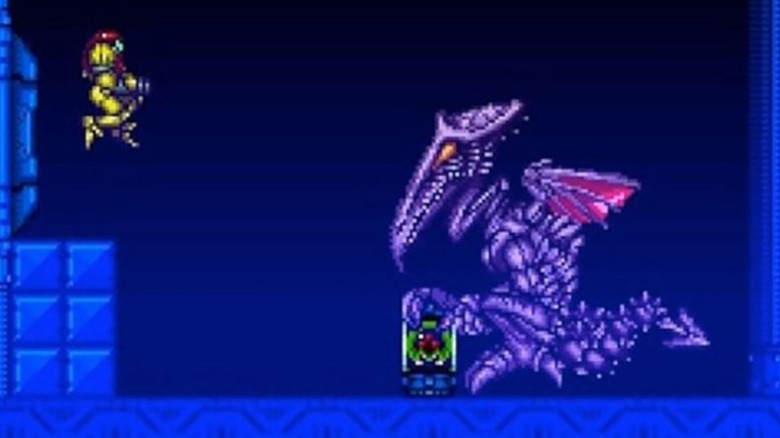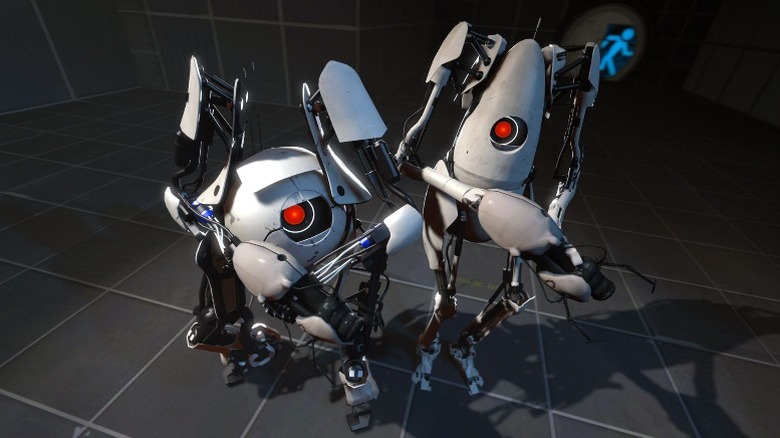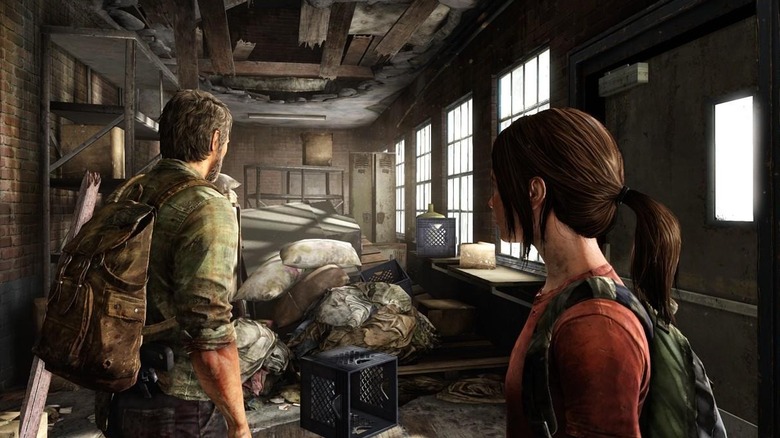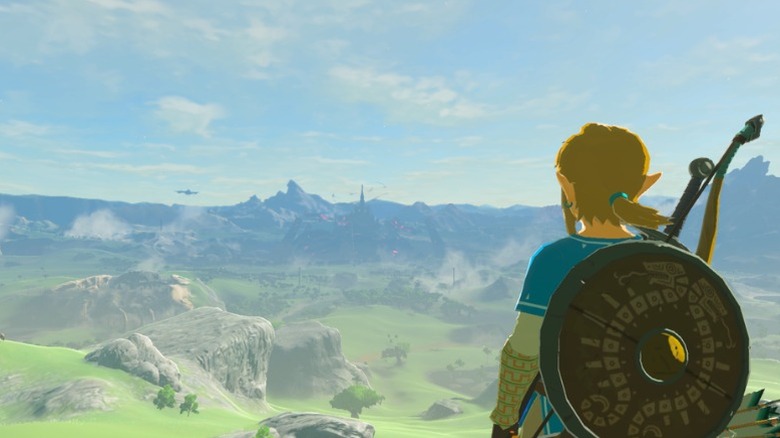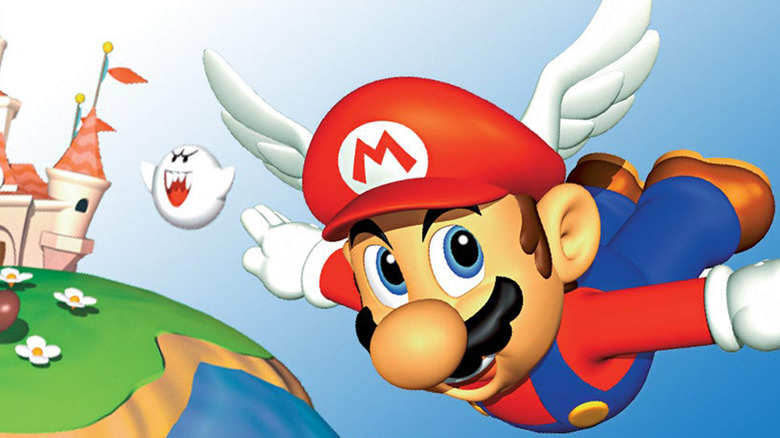98 Best Video Games Of All Time Ranked
Sometimes it's fairly easy to categorize the best games on a specific console, like the Nintendo Switch, or even the best games of a specific year. However, after opening up the boundaries and considering every video game made ever, things get a little more complicated. It's difficult to encompass decades of game development in one place – even if it is a lengthy one – but here, we've done our best to do just that. Every gamer has their own personal view of what constitutes a good game, but it's undeniable that the games presented here are each iconic in their own right.
These games vary wildly in age, genre, and replayability, but they have all helped shape the gaming landscape in some way. Whether they left their mark by establishing a new genre of game or reinventing an old one — or are just plain too much fun — each of these 98 games holds historical and pop cultural significance. Here are our top picks for the best video games of all time.
98. Ms. Pac-Man
Of course, some version of "Pac-Man" needs to be on this list. Alongside the likes of "Space Invaders" and "Galaga," it's one of the most famous arcade games of all time, and it's become a permanent pop culture staple over the years. While the original "Pac-Man" deserves all the credit for establishing the franchise back in 1980, its sequel made enough small improvements to become the definitive version of the game.
"Ms. Pac-Man" differs from its predecessor in seemingly minor ways, but they add up. There are four different maze variations, rather than just one, and some of them include more warp tunnels, which subsequently allow for more dynamic play. The ghosts are also upgraded, with more random behavior programmed into their movement to keep players on their toes. Lastly, the bonus fruit that appeared in the middle of the maze in "Pac-Man" stays mobile in "Ms. Pac-Man," increasing the risk of pursuing those delicious extra points. Taken as a whole, these changes make for a much deeper and more rewarding game (per GamesRadar+). "Ms. Pac-Man" remains a staple of bars and arcades even today, and for good reason — it's just that fun.
-
Release Date: January 13, 1982
-
Genre: Maze
-
Game modes: Single-player
97. RollerCoaster Tycoon
If you grew up playing PC games in the early 2000s, you're probably already quite familiar with "RollerCoaster Tycoon." Developed almost entirely by Scottish designer Chris Sawyer, the original game took the simulation genre on an amusement park adventure. Across a range of scenarios, each with their own distinct win conditions, players would build sprawling entertainment empires out of Ferris wheels, merry-go-rounds, log flumes, go-karts, snack stands, and of course, every kind of roller coaster you could possibly imagine.
The first "RollerCoaster Tycoon" became a sweeping success, spawning numerous sequels in a franchise that's still active today (per The Ringer). And while some of those successive titles certainly added meaningful augmentations to the core gameplay systems, nothing quite beats the original. If you just want to play the easier parks and build quirky rides, there's plenty of content for you in scenarios like Dynamite Dunes and Bumbly Beach. But for those who really love diving deep into the mechanics of sim games, "RollerCoaster Tycoon" has plenty of additional depth. It's incredible how much Sawyer got right on the first try back in 1999.
-
Release Date: March 22, 1999
-
Genre: Simulation
-
Game modes: Single-player
Advertisement
96. Galaga
Not every arcade game has stood the test of time, but "Galaga" is one early success that has aged like fine wine. "Galaga" was made as a spiritual successor to 1979's "Galaxian," which was itself inspired by the spacefaring combat of "Space Invaders" (via Den of Geek). All of these elements combined for something monumental.
"Galaga" arcade cabinets made their way to the United States in December of 1981, where the game was a smash success. The title wasn't just challenging, it was also a feast for the eyes and ears at the time, with multicolored ships filling the screen and every shot, crash, and tractor beam capture emitting a memorable sound effect. Namco has since made numerous sequels to the game, but nothing quite captures the simplistic magic of the original. That's probably why you'll find it included in so many retro gaming collections — and why every worthwhile arcade keeps a cabinet in stock.
-
Release Date: July 23, 1981
-
Genre: Arcade
-
Game Modes: Single-Player, Two-Player
-
Metacritic Score: 66 (Xbox 360)
Advertisement
95. Myst
"Myst" is an undisputed PC gaming classic, as well as one of the most famous puzzle games of all time. The game is basically a point-and-click adventure in which players explore a mysterious island filled with strange magical objects, intricate puzzles, and plenty of books filled with bits of the game's lore. Piecing together the overarching story is almost as difficult as solving the game's puzzles, but players who power through will be rewarded with a tale much deeper than it first appears.
Despite its simplicity, the popularity of "Myst" has endured for decades. Legions of "Myst" clones have been released over the years. In 2020, the original itself was re-released in VR for the Oculus Quest.The game may have some hardcore fans, but there many players have criticized it for being too slowly-paced and much too difficult to navigate and actually finish. Love it or hate it, PC games in general and puzzle games in particular wouldn't be the same without "Myst."
-
Release Date: September 24, 1993
-
Genre: Puzzle
-
Game Modes: Single-Player
-
Metacritic Score: 78 (PC)
94. Firewatch
The short runtime and low-key storytelling of "Firewatch" might not be for everyone, but many have found it to be a beautiful experience. Taking place in the wilderness of Montana in the summer of 1989, you play a tragic watchman who has retreated to this position to escape the world. What he finds is a mystery that parallels his own personal struggle and who he meets is Delilah, his supervisor and only point of human contact in this period of isolation.
Outlets like The Verge have praised the game's realistic geography and attention to detail. The strong writing and performances will enrapture you into the game's grand mystery full of conspiracy. The game's ending is melancholy and sparse, and may require replaying to fully understand, but "Firewatch" is worth that extra time. After all, the first-person "walking sim" only lasts a handful of hours. "Firewatch" is an indie triumph that will leave you with memories and questions for years to come.
93. Spec Ops: The Line
Many first and third-person military shooters like to show the horrors of war. Burned out buildings and countless corpses litter the ground, but usually these are just window dressing since viewers only see the aftermath. Few games let players witness the devastation unfold in real time, and even fewer use it to provide a poignant message that wags its finger at the captive audience. The underrated "Spec Ops: The Line" is one of them.
"Spec Ops: The Line" starts off simple enough and almost feels cliched: A small team of soldiers must venture into a Dubai devastated by sand dunes in order to extract a decorated AWOL military veteran. The game continues this cookie cutter design with seemingly generic gameplay with simple objectives, plenty of cover, and the occasional "important" decision. However, this is all a ruse. As "Spec Ops: The Line" progresses, the characters see their decisions come back to bite them. Gamers are forced to witness the brutal consequences of their actions and the horrors of war in real time, and they don't have the safety blanket of a cutscene to protect their consciences. The end result provides a powerful message about war and choice.
Instead of asking players to merely mull over their decisions, "Spec Ops: The Line" grabs them by the hair and shoves them headfirst into the fallout, refusing to let them look away. The game pulls zero punches and effectively demonstrates that in war, there's no such thing as a perfect choice.
92. Sam & Max Save the World
Before Telltale Games became synonymous with episodic narrative experiences, the studio cut its teeth on episodic point-and-click titles. Of these early titles, the "Sam & Max" series demonstrated Telltale's knack for developing licensed video games.
"Sam & Max" is based on a comic series about the misadventures of the titular duo of anthropomorphic animal police. The games, like their source material, are comedic and over the top to the Nth degree. As players wander around the episodic levels of "Sam & Max Save the World" franchise, they have to solve various puzzles using their wits, observation skills, and the occasional bit of cartoon logic. While this is standard of most point-and-clicks, the zany world of "Sam & Max" is full of sights you won't find anywhere else, be it a teddy bear-themed mafia or a debate with a sentient Abraham Lincoln statue. And don't even get us started on the main characters' banter. Let's just say the dialogue will leave most players in stitches.
While Telltale's original "Sam & Max" is no longer available for purchase, gamers can buy the remastered version, which sports updated graphics and some censorship. However, anyone who is a stickler for the original presentation (and jokes) can buy the remastered version and download the original game as free DLC.
91. Sly 2: Band of Thieves
Way before creating samurai slasher "Ghost of Tsushima," Sucker Punch Productions was in charge of an anthropomorphic raccoon. "Sly Cooper" was a traditional 3D platformer, but "Sly 2" is where the series took a 180. "Sly 2: Band of Thieves" retains the 3D platforming, but slaps on exciting overworlds and heists. The change worked so well that subsequent sequels kept the formula.
Sly, Bentley, and Murray are three master thieves on the run from the police, and criminals alike. In their second outing, heists are the focus. Recon, tailing, and infiltrating missions are performed prior to the big night in which the gang steals the desired item. Various challenges are located within the many hub worlds. USgamer commended these hubs, describing them as feeling like smaller open worlds.
Despite the shift in gameplay, "Sly 2" stays true to the original's tone and storytelling. "Band of Thieves" is a different kind of sequel that shows how shaking up a series can really pay off.
- Release Date: September 14, 2004
- Genre: Platformer
- Game Modes: Single-player
- Metacritic: 88 (PS2)
90. Journey
In some ways, "Journey" defies genre. It's technically an indie platformer that follows a lone character on a daunting pilgrimage. Throughout the titular journey, the character learns about the lore of the world through a series of murals, all while collecting pieces of a scarf that grants them the ability to glide farther and farther distances.
While traveling, the pilgrim can meet other players – each on their own journey – and communicate through a series of chirps and musical tones. While the two can't chat via voice, this vague multiplayer mechanic allows players to feel connected in a more emotional way than one might expect. IGN noted this interesting mechanic as a particular highlight of "Journey," and it's easy to see why the game was a hit with both players and critics.
One Redditor described "Journey" as a title that "showcases what a game can be like, a piece of media with unquestionable and easy to identify extreme artistic value." It's got a little something for most gamers, and it's short enough to beat in one sitting, so there's no excuse not to check out this indie gem.
- Release Date: March 13, 2012
- Genre: Action-adventure, indie, platformer
- Game modes: Single-player
- Metacritic Score: 92 (PlayStation 3, PlayStation 4)
89. Gears of War 3
The first three "Gears of War" games are a great example of iteration done right. The first game was pretty bare-bones — a horror-inspired campaign of decent length that could be played by one or two people, and a five-on-five competitive multiplayer component with a handful of fast-action modes. "Gears of War 2" added new kinds of weapons and equipment, drastically expanded the scope of the campaign, and added in Horde mode, a co-op wave-based survival arena that saw a resurgence and has become a staple of many other games.
"Gears of War 3" took all of that precedent and improved on it in numerous ways. The epic campaign (no pun intended) allowed for four-player co-op and the competitive multiplayer saw the addition of new modes and options to expand its appeal beyond hardcore gamers. A whole new faction of enemies made for a "Halo"-esque combat puzzle far beyond that of the prior two games. Horde mode was fleshed out with a fun base-building component and a system of progressive unlocks. Plus, Epic brought in Karen Traviss, author of the surprisingly great "Gears of War" novels, to work on the game's story, resulting in a third act for the trilogy that's packed with emotion.
-
Release Date: September 20, 2011
-
Genre: Third-person shooter
Advertisement -
Game modes: Single-player, online multiplayer, local multiplayer
-
Metacritic Score: 91 (Xbox 360)
88. Hades
"Hades" tells the story of Zagreus, the disgruntled demigod son of Hades who is trying to escape from his father's domain. It's a rougelike that builds on the story as the players progress through it.
Each time Zagreus dies, he returns to the House of Hades. His experiences at home give at least something to look forward to after death, including power-ups and bonding experiences. It's as if there's unique dialogue and new interactions to witness each time he reawakens in the underworld. Sometimes he'll even trigger a "cutscene" that lets the player witness what led to his strained relationship with his father and desire to venture outside of the Underworld.
Another way "Hades" revolutionizes the genre is with how it incorporates a way for players to lighten the experience if the rougelike proves too challenging for them. There's a "God Mode," which lessens the damage the player takes and raises the threshold each time they die. The game also allows players to spend resources from past runs on power-ups like a heartier health bar, thicker skin, and other perks.
87. Viewtiful Joe
Henshin A-Go-Go, baby! "Viewtiful Joe" is a wacky spoof of Japanese superhero shows like "Kamen Rider," incorporating elements of 2D beat-em-ups, platformers, and puzzlers. It's hard to find other games as quirky as this.
Traveling through different movie worlds and genres, Joe strives to save his love interest, Sylvia. Along the way, he learns to speed up and slow down time, which affects both combat and puzzle-solving. For instance, small water droplets can grow bigger when time is slowed, which can create safe spots to move in a lava-based level. Likewise, slowing time will expose some enemy weaknesses during fights. Eurogamer's review specifically applauded the way in which these abilities were used during puzzle segments.
The action itself is incredibly fun, not only because of the abilities, but the purchasable skills as well. After every level, the player is greeted by a shop in which they can snag health upgrades, items, or new moves for combos, all of which add more layers to an already-solid romp.
86. Devil May Cry 5
"Devil May Cry 5" proves to be the culmination of every element in the classic series, particularly when it comes to combat. And the four vastly different playable characters are why this hack-and-slash game stands above the rest. Action is the name of the game here. Nero, V, Dante, and Vergil (in the "Special Edition") make up the roster and all have individual playstyles. IGN stated that each character has "enough depth to carry a game of their own," which is a testament to how seriously "Devil May Cry V" takes combat.
Nero relies on his exhaust-based sword and robotic arms while V acts as a summoner. Vergil has flashy katana attacks that help differentiate him from the others. Lastly, Dante is a force to be reckoned with: four stances and twelve weapons make him the most well-rounded and complex of all the playable characters. Using all four is an absolute joy, especially since each level is highly replayable and combo options are almost limitless. "DMC 5" is what every action game should strive to be.
- Release Date: March 8, 2019
- Genre: Hack-and-slash
- Game Modes: Single-player
- Metacritic: 87 (Xbox One), 84 (Xbox Series X/S), 88 (PS4), 89 (PS5), 89 (PC)
85. Dragon Quest 8: Journey of the Cursed King
Many turn-based JRPGs try to inject unique battle mechanics to spice up the experience. There is nothing wrong with this strategy, as the Active Time Battle system of "Final Fantasy 4" became the franchise standard for many entries. However, RPG series such as "Dragon Quest" stick to the tried-and-true turn-based system and would rather stand out via presentation. With 11 entries under its belt, not including spinoffs, some are bound to be better than others.
While virtually every "Dragon Quest" game is memorable, none reach the same heights of "Dragon Quest 8: Journey of the Cursed King." Since the game was the franchise's first foray into 3D, the developers pulled out all the stops to provide a jaw-dropping experience, and they succeeded. The story, music, and comedy are widely regarded by fans as top notch, even among the normally hilarious "Dragon Quest" franchise, and the voice acting walks a fine line between emotionally grounded and enjoyably campy.
Not many game franchises survive the transition to 3D, but "Dragon Quest 8: Journey of the Cursed King" didn't just survive, it thrived. "Dragon Quest 8" is now the measuring stick for the entire franchise.
84. Team Fortress 2
In an era before "Overwatch" and "Valorant," "Team Fortress 2" was the dominant class-based multiplayer first-person shooter on the market — a title it held for a long, long time. The original structure of the game made it both easy to jump into and incredibly complex for those who wanted to dive deep: Nine distinct, immediately identifiable classes and a handful of maps built with specific objectives in mind. Lots of additional game modes, weapons, and other pieces of content were released steadily through the years by Valve Software, but it was the foundation of "TF2," perfectly represented by the iconic character selection screen, that made it so popular out of the gate.
Aside from just being loads of fun, "Team Fortress 2" also left major marks on the gaming industry. It helped popularize the modern class-based shooter. Its cosmetics-based free-to-play business model was similarly impactful, foreshadowing the direction future games like "Dota 2" and "Fortnite" would ultimately take (per Rock Paper Shotgun). Whether you played on a souped-up PC with all the extra content or an Xbox 360 with only the base game, you had a great time playing "Team Fortress 2," and you still can today.
-
Release Date: October 10, 2007
-
Genre: First-person shooter
-
Game modes: Online multiplayer, single-player
-
Metacritic Score: 92 (PC)
83. Hollow Knight
In terms of Metroidvania games that don't have "Metroid" or "Castlevania" in the title, "Hollow Knight" is one of the best to ever do it. In fact, depending on how into "Dark Souls" you are, you may even find this little gem to be the best Metroidvania ever made. You start as a humble bug, exploring the dangerous caverns of Hallownest as you ascend your way to becoming a great warrior. With touches of "Souls" in its world-building and writing, as well as exploration inspired by the best "Metroid" games and their ilk,"Hollow Knight" excels in every category.
But "Hollow Knight" also creates something unique on its own. The stunning environments and enemies you uncover as you dig deeper are only one bonus. With tons of upgrades, pins, and new abilities to be unlocked, you are constantly shifting your load-out and trying new tactics. And you'll have to if you want to beat the game's gauntlet of challenging bosses and world full of tragedy and pitfalls. As you dig deeper into Hallownest, "Hollow Knight" keeps providing hours of new hidden paths to explore, not to mention memorable characters that help flesh out the fascinating world.
82. Borderlands 2
"Borderlands 2" is an improvement upon the first game in almost every way. First and foremost, Handsome Jack needs to be discussed. Jack is a memorable antagonist who gives a unique flare to the game. While journeying through Pandora, he pokes fun at the player through audio calls, and his dialogue is outrageous and clever. Most fans are vocal about Dameon Clarke's excellent voice performance, too.
Ratcheting up the action, "Borderlands 2" doubles down on the elemental damage. There's incendiary, slag, corrosive, explosive, and shock elements at play. All provide different benefits and can be a real help in the right situation. This elemental system was also found in the first game, but "Borderlands 2" ups the variety and incorporates them into its zillions of guns.
The "Borderlands" story is also more fleshed out in this game, and those who finished "Borderlands 2" without doing the DLC are doing a disservice. "Assault on Dragon Keep" is most noteworthy with easter eggs in "Tiny Tina's Wonderlands" being found.
81. Kentucky Route Zero
This modern point-and-click classic was released over the course of 8 long years. Consisting of five parts and five short intermissions, "Kentucky Route Zero" was completed in 2020 for PC and consoles. You control many characters over the course of the game's many experimental episodes, but you begin simply as Conway, a man who needs to deliver a package across a broken and strange land.
The end goal of reaching the intended address at Dogwood Drive is not as much the focus in "Kentucky Route Zero" as its characters and dialogue. Writing for Rock Paper Shotgun, Alex Wiltshire noted that the way the player chooses dialogue for the characters makes you feel like a co-author to the story, in contrast to the way most games use simple moral choices to put you in the shoes of a specific character. "Kentucky Route Zero" deftly uses mood and tone to make sure the player relates to all of the characters all at once. Melancholy folk music further sets the mood for this surreal adventure into the dark side of the American south.
80. Doki Doki Literature Club
"Doki Doki Literature Club" doesn't appeal on the same level as triple-A games that last for 40+ hours. It offers a unique, weirdly self-aware experience in a game that can be wrapped up in a couple hours. It's also one of the creepiest games of its decade. The protagonist joins the school literature club with his childhood friend Sayori, where he meets the shy beauty Yuri, the rough but sweet Natsuki, and the cheerful, mysterious club president, Monica.
It's a visual novel with a horror element to it. It has a few moments that might be considered jump scares, but it also plays into player anxiety with visuals, music, and a general setup of twisting what the player thought they knew about the game's world and how it works.
"Doki Doki Literature Club" would later be followed by a remastered version called "Doki Doki Literature Plus," which featured additional content that gave more insight into the characters that players loved. "Doki Doki Literature Plus" was better rated than the original game for PC, but it wouldn't exist without the fanbase the original created.
- Release Date: October 6, 2017
- Genre: Visual Novel
- Game modes: Single-Player
- Metacritic Score: 78 (PC)
79. Ratchet & Clank: Up Your Arsenal
The PlayStation 2 was a hotbed of experimentation in the 3D platformer genre, spawning stealth hybrids like "Sly Cooper," open-world sandboxes like "Jak 2," and weapons-heavy quasi-shooters like the "Ratchet & Clank" games. Insomniac's sci-fi adventure quickly became one of the defining franchises of the platform, and Ratchet and Clank have remained big names in Sony's catalog ever since.
There have been a lot of great "Ratchet & Clank" games over the years, but the best and most well-rounded of the bunch may still be 2004's "Up Your Arsenal," the third entry in the series (per Inverse). It took all of the innovations from "Ratchet & Clank: Going Commando" — leveling up and evolving weapons over time, dedicated strafing and other combat-focused abilities, more robust health and armor systems — and tweaked them in meaningful ways. The arsenal of guns was ironically cut down, but each one that was included had its time and place. The arena battles of the second game were also expanded, multiplayer options were added, and the series' trademark brand of cartoon comedy was never stronger.
-
Release Date: November 3, 2004
-
Genre: Platformer
-
Game modes: Single-player, online multiplayer, local multiplayer
-
Metacritic Score: 91 (PS2)
78. Okami
Usually, a video game's quality translates into monetary success. Many companies love to flaunt sales numbers and occasionally use them in advertising, but every now and then a game sells poorly despite the sheer talent and polish on display. Those titles usually only receive the recognition they deserve years after release – and in the case of "Okami," after the studio behind it closed.
The world in "Okami" is rendered in a unique and eye-catching style that replicates the colors and brush strokes of traditional Ukiyo-e paintings, and the soundscape is just as beautiful thanks to its similarly traditional Japanese instruments. Moreover, the story and characters of "Okami" borrow heavily from Japanese mythology and are quite funny, relying heavily on good old slapstick comedy. While "Okami" is almost "Zelda"-like in its world and dungeon layouts, the game also distances itself from its inspiration by extending the Ukiyo-e stylings into gameplay — most skills are the product of an in-game paintbrush players use to affect the world.
"Okami" is the complete gaming package. The game is a feast for the eyes and ears; its story and characters stick with audiences, and the gameplay is polished while also blending seamlessly into the aesthetics. Quite frankly, it's a mystery why no one bought this awesome game when it was released.
77. Batman: Arkham City
"Batman: Arkham Asylum" single-handedly demonstrated how to properly create a great single-player video game based on a popular superhero. But as is the case with most successes, the game left audiences wanting more, specifically a "Batman" game that let them explore all of Gotham City instead of restricting them to the dreary (but enjoyable) halls of Arkham Asylum. Those prayers were answered with "Batman: Arkham City."
To put it simply, "Batman: Arkham City" is "Batman: Arkham Asylum" perfected. The game features the same fantastic, fluid combat as its predecessor, but "Arkham City" gives players even more gadgets to work with. Moreover, since "Arkham City" takes place in the titular Arkham City (a walled-off section of Gotham), the world is much bigger. Gamers have full reign to leap across rooftops and glide as they see fit, all while exploring a story that is among the caped crusader's best. And if that wasn't enough, "Arkham City" also has plenty of side activities that star a wide roster of crooks, goons, and supervillains dredged up from Batman's Rogues gallery.
"Batman: Arkham City" set the bar so high that its sequels have yet to eclipse it.
76. Horizon Zero Dawn
Many post-apocalyptic games take place in the ruins of a world ravaged by war. The residents still have access to technology, but they often can only maintain what they have and cannot build new gadgets. But what would a post-apocalyptic world look like if advanced robots still existed while the human population was reduced to caveman tech? "Horizon Zero Dawn" answers that question.
"Horizon Zero Dawn" tells the story of Aloy as she travels a world filled with prehistoric-level societies and robot dinosaurs. The mystery of Aloy's past and how the world ended up in this backwards state drives the narrative and is half the game's fun; the other half is the thrill of the hunt. "Horizon Zero Dawn" borrows several ideas from "Monster Hunter" (in a good way) as Aloy needs to dismantle robotic beasts and collect their parts to craft new items and equipment. The biggest, toughest enemies thrash around like giant "Monster Hunter" quarries, and Aloy can't acquire the rarest, most valuable pieces of scrap unless she breaks certain robot parts.
"Horizon Zero Dawn" was followed up by the graphically superior "Horizon Forbidden West," but you know what they say: Audiences can only be introduced to the splendor of a giant robot Tyrannosaurus with back-mounted rockets and cheek lasers once.
75. Psychonauts
Many collectathon platformers follow a reliable formula, which usually involves trekking through disparate themed levels such as desert, ocean, and haunted circus. "Psychonauts" is not one of those games.
"Psychonauts" is the brainchild of Double Fine (pun definitely intended), as well as another flop that later became a success with fans. In the game, players take control of Razputin, a psychic circus performer who ran away from home to pursue his lifelong dream of joining the titular Psychonauts, a government-funded group of psychic secret agents. As is collectathon tradition, players slowly accrue new abilities to open up new locations and combat strategies. And Instead of traveling through strange deserts and swamps, players have to traverse the often-twisted minds of different characters, each filled with symbolism, unique setpieces, and the occasional flower made of meat. To add to the attractive insanity, every NPC is as funny as they are oddly proportioned, and the story walks a tightrope between serious, campy, and tongue-in-cheek without ever losing balance.
While "Psychonauts" shows its age in the graphics department, the game has lost none of its charm, quality, or polish. "Super Mario" titles wish they had levels even half as memorable or imaginative as the legendary Milkman Conspiracy.
74. Outer Wilds
It is so hard to explain what makes "Outer Wilds" so special without spoiling the game. Simply put, this 2019 indie from Mobius Digital is a first-person space exploration game where progress is gated by knowledge. You are stuck in a time loop, reliving the last moments before the sun supernovas and your solar system explodes. Each loop begins with the protagonist launching their janky ship into space and choosing a destination. You must visit each planet and translate the writings from an ancient alien race if you want any hope of reversing the supernova. As you explore the waters of Giant's Deep or solve the puzzles of the Ash Twins, "Outer Wilds" shows it is brimming with originality at every turn, earning it praise from outlets like Polygon.
Using just a small set of tools, the environmental and cerebral puzzles you encounter in "Outer Wilds" will test your memory and your ability to think on your feet. Progress is measured in each bit of knowledge gained, but "Outer Wilds" also isn't afraid to let you die for making silly mistakes. The solar system feels dangerous, tapping into the existential dread of space. By the end of the game that dread is turned into a gorgeous melancholy that forces you to face the fear of the vast, sprawling unknown head on.
73. Dead Cells
Roguelikes follow a fairly steady formula: randomly generate levels, sometimes with randomly generated loot, and force players to run gauntlets of challenging enemies. Each session is isolated from every other — the occasional permanent unlocked buff notwithstanding — but what happens when a roguelike implements level design cribbed from genres that rely on backtracking?
"Dead Cells" combines roguelike replayability with metroidvania map design. The game focuses on fast, enjoyable platforming and action through randomly generated levels. While the game features the fun, age-old roguelike system of locking new weapons behind collectibles, later levels also hide permanent upgrades that players can use in earlier biomes to open up new areas. As a result, players always find something new, no matter how many times they start over.
What "Dead Cells" lacks in story, it more than makes up for in sheer entertainment factor. Plus, the developers are constantly updating the title and have churned out a steady stream of free and paid DLC that have added all-new loot, levels, and enemies.
72. Fire Emblem: Three Houses
"Fire Emblem: Three Houses" was one of the most divisive games of the series thanks to its successfully morally gray paths. Byleth serves as the teacher for one of three houses: the Black Eagles, Blue Lions, and Golden Deer. They ultimately enter a war between the leaders of the three houses with his house of choice.
Players choose between the three houses after gauging the leaders' values after a practice battle and chatting with the students. This represents a step up from "Fire Emblem: Fates" and its three paths, which players criticized for featuring moments that felt too pacifistic and out-of-character for the protagonist at certain points for the sake of plot. "Fire Emblem: Three Houses" also caters to the crowd that enjoys the social sim elements from newer "Fire Emblem" games. Byleth is able to recruit most of the students and interact with them during bond-boosting "tea times" and training sessions. Some argued that it was a bit of a chore grinding through friendship and skill levels, but others enjoyed them as a buffer between battles.
"Fire Emblem: Three Houses" was successful enough to win The Game Awards 2019 Player's Voice Award. It also led to the development of "Fire Emblem Warriors: Three Hopes," which seems to take place in an alternate timeline starring the same characters with a different protagonist.
- Release Date: July 26, 2019
- Genre: JRPG, Strategy RPG
- Game modes: Single-Player
- Metacritic Score: 89
71. Pokémon Diamond and Pearl
There are a lot of fantastic "Pokémon" games. There are also a lot of incredibly similar "Pokémon" games. It's no secret that Game Freak, Nintendo, and The Pokémon Company haven't always prioritized innovation in the core series, which can make ranking one game against another difficult. There are a couple of reasons, however, why "Diamond" and "Pearl" uniquely deserve spots on this list.
"Diamond" and "Pearl" began the fourth generation of "Pokémon" games and marked the core series' debut on the Nintendo DS. The hardware upgrade came with some big additions, including the ability to trade Pokémon online with friends and strangers and battle other players via wi-fi. The DS also brought a major graphical update to the franchise, making the Sinnoh region one of the most beautiful and enrapturing locations ever seen in a "Pokémon" game (and one the series has continued returning to).
The sheer number of distinct areas, legendary Pokémon side quests, post-game options, compelling enemy gangs, and beautiful tunes made "Diamond" and "Pearl" stellar entries in a beloved franchise, and arguably the best the mainline "Pokémon" series has ever been (per Den of Geek).
-
Release Date: April 22, 2007
-
Genre: RPG
-
Game modes: Single-player, online multiplayer
-
Metacritic Score: 85 (DS)
70. Shin Megami Tensei 5
"Pokemon" popularized the concept of capturing creatures with supernatural abilities and leading them into battle, but the franchise has a pretty low bar of entry thanks to its kid-friendly atmosphere and minor difficulty curve. What would the series look like if its combat was gut-punchingly difficult and its narrative dove into mature themes of morality and self-determination? And instead of commanding electrical rodents and rock snakes, you made pacts with angels and demons.
"Shin Megami Tensei 5" is the latest entry in the "Shin Megami Tensei" franchise, which is the older sibling of the far-more popular "Persona" franchise. The game faithfully continues many of its precursors' hallmarks, such as the ability to recruit virtually any enemy — and sacrifice them to summon powerful allies — and a battle system that punishes simple mistakes and rewards ingenious planning. However, "SMTV" also adopts new ideas to perfect the formula. Instead of funneling players through dungeons, the game boasts a large map for players to explore, and the combat system has been balanced to promote new strategies without sacrificing the mechanics that made the series stand out. Moreover, the graphics of "SMT 5" surpass most Nintendo Switch titles (with some minor performance hiccups as a tradeoff), and the game's soundtrack is as eccentric as it is memorable.
Some gamers might want to write off "Shin Megami Tensei V" as "Persona 5" but harder, and while that is an accurate if oversimplified assessment, it is also a glowing recommendation.
- Release Date: November 11, 2021
- Genre: Role-playing, Strategy
- Game Modes: Single-player only
- Metacritic Score: 84 (Switch)
69. Super Mario Bros. Wonder
"Super Mario Bros. Wonder" is a wonderful reminder of everything that makes this franchise so enduring. After years of 2D "Mario" games being largely dominated by the "New Super Mario Bros." style, fans of the classic platforming series were begging for something new. "Super Mario Bros. Wonder" provides this and much more, completely reinvigorating the classic "Mario" art style, music, and gameplay, all while giving Mario a new voice. "Wonder" provides an almost claymation-esque style that's extremely playful and vibrant. Additionally, the usual 2D/2.5D "Mario" gameplay is given some fun new twists, with many new movement options including a grappling hook and a gliding move. Between charming musical levels and difficult challenge levels, "Wonder" is one of the most whimsically fun 2D platformers ever to release.
The main gimmick of "Super Mario Bros. Wonder," revolves around a peculiar new item called the Wonder Flower. When Mario collects it, the level will warp into something completely different, changing the straightforward platforming gameplay in new and exciting ways. Turning Mario into a Goomba, summoning a legion of singing Boos, and starting a massive stampede of wild beasts are just a few of the amazing and unique ways that "Wonder" keeps its gameplay fresh throughout the entire experience.
- Release Date: October 20, 2023
- Genre: Platformer
- Game Modes: Single-Player, Multiplayer (Up to 4), Online Multiplayer
- Metacritic Score: 92
68. Phoenix Wright: Ace Attorney
As noted by DBLTap, this visual novel adventure spawned a series that has garnered a rabid and diverse fanbase to be reckoned with. Now on modern consoles thanks to the "Ace Attorney Trilogy" collection, the first "Phoenix Wright" game is the place to dive in. After a dozen main games and spin-offs in, it remains one of the best in the series. Each of the game's main three cases (plus the excellent bonus case added in the DS port) are filled to the brim with over-the-top and memorable characters, locations, and plot twists that make "Phoenix Wright: Ace Attorney" feel like a classic detective short story collection.
As upstart lawyer Phoenix Wright, players are introduced to a cast that includes fledgling mystic and top-tier assistant Maya Fey, Detective Gumshoe, and fearsome rival prosecutor Miles Edgeworth. Gather clues in the investigation sections before going into the iconic (and hilarious) courtroom sections for which these games are known. Once you give it a try, you'll be screaming "Objection!" in no time.
- Release Date: October 12, 2005
- Genre: Visual Novel, Adventure
- Game Modes: Single-Player
- Metacritic: 81 (DS)
67. Katamari Damacy
There is nothing like "Katamari Damacy." Rolling up objects into a gradually growing ball is a uniquely pleasant and silly experience. The gameplay premise is simple but "Katamari" runs with it. Every level is in a different location with a different catchy song. It's one of the strangest and most whimsical games out there, and it's still a marvel to play.
After wreaking havoc in space, The King of All Cosmos forces the Prince to fix up his mess. In doing so, the player must roll up objects and bits of scenery that will eventually become stars. Performing this task comes with a learning curve, thanks to the dual analog controls, but everything eventually clicks and moving the giant ball becomes second nature.
"Katamari Damacy" exudes absolute style. The cartoonish visuals and outlandish cutscenes are especially distinct. What takes the spotlight, however, is the soundtrack, which outlets like GameSpot have praised for being "insidiously infectious".
Basically, "Katamari" excels in pretty much every category.
- Release Date: September 21, 2004
- Genre: Puzzle, Platformer
- Game Modes: Single-player
- Metacritic: 86 (PS2)
66. Grim Fandango
LucasArts is one of the most important names in the history of the adventure game genre, with numerous classics like "Day of the Tentacle," "Full Throttle," and "The Secret of Monkey Island." Each of those games has earned a definitive spot in the point-and-click pantheon, and they all helped pave the way to arguably the studio's greatest accomplishment in the genre: 1998's "Grim Fandango."
Led by legendary game designer and Double Fine founder Tim Schafer, the LucasArts team brought all of its adventure game experience to bear on "Grim Fandango," a sprawling tale of a wayward grim reaper named Manny who wanders the land of the dead in search of love and meaning. There are hot rods, mob bosses, underwater expeditions, picture-perfect parodies of classic noir films, and balloon animals shaped like Robert Frost — clearly a winning formula for an all-time great game.
The mechanics here are sound and the puzzles are fun to unravel, but what really pushes "Grim Fandango" to the top of its field is the unique and compelling nature of its smoky afterlife (per The Ringer). Every character is brought to life beautifully, the locations are fun and interesting, and the jokes hit nearly every time. In brief, it's hard to find an adventure game better than "Grim Fandango."
-
Release Date: October 14, 1998
-
Genre: Adventure
-
Game modes: Single-player
-
Metacritic Score: 94 (PC)
65. Undertale
"Undertale" is one of the most successful games made by one person. Creator Toby Fox drew inspiration from the likes of "Earthbound," "Legend of Zelda," and others to create the pixel perfect graphics (with some help from Temmie), music, and general feel of an early '90s game with anime humor. A silent protagonist falls into a world full of monsters and must choose their own way out. Charm monsters into surrender or do it by force?
"Undertale" differs from the typical RPG with its "combat." Players have the option to choose between different actions like fighting or sparing a foe. During the opponent's attack sequences, players must survive a bullet hell puzzle, typically by evading "bullets" — a.k.a. moving obstacles that aren't necessarily bullet-shaped. The game also tracks the player's actions, such as whether or not it's your second run or if you've been a monster mass-murderer in a past save.
After the game's initial success on PC, it was ported to PlayStation 4 and Nintendo Switch. Toby Fox is now working on his second project, "Deltarune."
64. Eternal Darkness: Sanity's Requiem
Survival horror games usually try to scare players by keeping them invested; if players forget they're playing a game, its scares will probably fall flat. The underrated "Eternal Darkness: Sanity's Requiem," on the other hand, terrifies audiences by breaking the fourth wall with some of the most creative scares in any medium ever.
On the surface, "Eternal Darkness: Sanity's Requiem" is a glorious survival horror game that pits players against unknowable, godlike entities that take clear inspiration from H.P. Lovecraft and infest the polished sound design, story, and levels. Nothing horror veterans haven't seen before, but "Eternal Darkness" has lived on in audiences' hearts and minds thanks to its sanity system. The lower the player's sanity meter, the more the game inserts disturbing sights and jumpscares. Some only exist within the game's world, such as flying books and bleeding paintings, while others shatter the fourth wall and trick players into thinking they accidentally disconnected their controller or changed the channel.
The sanity system of "Eternal Darkness: Sanity's Requiem" guarantees that no two playthroughs are the same due to the random nature of its scares. No horror game is quite like "Eternal Darkness," thus guaranteeing it a place in video game history. Then again, Nintendo did copyright the sanity system, which might explain why no other studios have tried to copy it.
- Release Date: June 24, 2002
- Genre: Action, Adventure, Survival horror
- Game Modes: Single-player only
- Metacritic Score: 92 (GameCube)
63. Pokemon Legends: Arceus
After "The Legend of Zelda: Breath of the Wild" wowed audiences with a vast open world that didn't hold players' hands, virtually every game studio wanted to copy the formula, including Game Freak. Turns out the open world model (or at least something very close) really suits the "Pokemon" franchise, which until recently was beginning to feel formulaic. Plus, fans have wanted an open world "Pokemon" game ever since the genre became popular.
"Pokemon Legends: Arceus" throws out much of what makes a "Pokemon" game and replaces it with a large explorable map, which isn't a complaint. Instead of tasking players with catching every Pokemon and using them to battle Trainers and Gym Leaders, the game primarily focuses on the first part: "Arceus" is all about the catching. But to its credit, the game makes each catch feel rewarding. And since the different biomes are as vast as they are varied, players can potentially spend countless hours just wandering the lands and catchin' 'em all without feeling bored. But if they do, "Legends Arceus" also packs in a smorgasbord of story missions and side quests to complete.
Even though "Pokemon Legends Arceus" isn't a true open world game, it still nails the feeling of adventure and the joy of exploration that comes with one. With any luck, future "Pokemon" games will copy (or better yet, perfect) this formula.
- Release Date: January 28, 2022
- Available On: Nintendo Switch
- Genre: Action, Role-playing
- Game Modes: Single-player only
- Metacritic Score: 83 (Switch)
62. Alan Wake 2
In October 2023, cult classic "Alan Wake" finally received a long-awaited follow-up in the form of "Alan Wake 2." The original "Alan Wake" was praised for its tight third-person gameplay and engaging psychological thriller plot, so the gaming community had high expectations for the sequel. For most, "Alan Wake 2" not only delivered on this promise, but also greatly expanded upon Remedy Entertainment's connected universe. While the original entry was more of an action-adventure game with elements of horror, "Alan Wake 2" feels more like a pure survival horror game that masterfully blends a combination of tense investigative sequences, atmospheric thrills, and even kooky musical numbers. From the very beginning, "Alan Wake 2" is a gripping experience that is bound to surprise even some of the most diehard fans of the original.
The gameplay follows the story of two different characters: Author Alan Wake, who has just escaped from the supernatural realm called the Dark Place, and FBI agent Saga Anderson, who was sent to the town of Bright Falls to investigate a series of murders. Players can choose the order in which they complete each characters' story, allowing them to slowly uncover the mind-blowing mystery that connects them. To explain the twists and turns that follow would take away from the fun, so curious readers should definitely give "Alan Wake 2" a chance.
61. Knights of the Old Republic
Bioware's "Knights of the Old Republic" is a stunning pairing of "Star Wars" lore and groundbreaking RPG mechanics. The game takes place thousands of years before the first "Star Wars" movie and introduces a lengthy galactic timeline that influences everything from the events occurring on explorable planets to players' own choices. Over the course of the game, players transform from a small-time nobody in the galaxy to a powerful Force user who will influence the next thousand years of history.
"Knights of the Old Republic" is an open-ended adventure that allows players to craft just about any kind of character they can dream up. Along the path to becoming either a Jedi master or Sith lord players will put together a party of followers and encounter all manner of dangers and deep "Star Wars" lore. "Knight of the Old Republic" isn't just great for "Star Wars" diehards, it's one of the best RPGs of all time.
60. Persona 4
The "Persona" series began in 1996 as a spin-off of developer Atlus' successful "Shin Megami Tensei" franchise. Since then, "Persona" has gone on to carve itself a unique place in the gaming world. Part classic JRPG and part relationship sim, "Persona" games tell long, richly detailed stories centered on the lives of teen protagonists.
"Persona 4," originally released for the Playstation 2 in 2008, perfectly combines storytelling, strategic combat, and relationship management into an experience that feels like living through your favorite anime. The game's mostly silent protagonist is sent to live in Inaba, a sleepy Japanese town that begins to be rocked by a series of brutal murders. Relying on the help of their closest friends and a healthy dose of magical abilities, players will solve the case — all while surviving high school and getting to know the people of Inaba. The game is several dozen hours long, but tense combat and emotional character arcs keep up the momentum from beginning to end.
-
Release Date: July 10, 2008
Advertisement -
Genre: JRPG
-
Game Modes: Single-Player
-
Metacritic Score: 90 (PS2)
59. Uncharted 3: Drake's Deception
Nathan Drake has undergone countless quests in the vein of Indiana Jones, but "Uncharted 3: Drake's Deception" contains the series' most defining set pieces. Being thrown out of a cargo plane and struggling to climb back up is just iconic, so much so that it even inspired a sequence in the "Uncharted" movie.
"Uncharted 2" is where the series really came into its own, particularly with the intro train climb sequence. "Uncharted 3" keeps the pace and arguably has greater moments. Along with the cargo plane, Nathan Drake makes his way onto a flooding cruise ship, desert tanks, and uninhabited city ruins. Destructoid noted that the gameplay entirely suits each section of the game perfectly.
Platforming, brawling, shooting, and puzzle solving are all here and better than ever, arguably making this the pinnacle of the "Uncharted" series. The PlayStation 3 game juggles all of these elements and manages to come out on top.
- Release Date: November 1, 2011
- Genre: Third-person shooter
- Game Modes: Single-player, Multiplayer
- Metacritic: 92 (PS3)
58. Yakuza 0
This was the game that put "Yakuza" on the map for many outside of Japan, as Sega noted in an interview with Game Informer. Although it came to the US in 2017, over 10 years after the series began on PS2, "Yakuza 0" is the perfect place for series newcomers to start. It's the result of the "Yakuza" team firing on all cylinders and telling one of the best stories in the series. Most importantly, it is a prequel that leads directly in the "Kiwami" remakes of the first two games in the franchise.
Mixing high stakes crime drama and absurdist comedy, "Yakuza 0" follows the origins of Yakuza legends Kiryu Kazama and Goro Majima as they get mixed up in a mafia land grab that causes the two to meet for the first time. Combat is simple, but uses over-the-top action moves to keep everything moving at a bombastic pace. The game packs hilarious and heartbreaking character moments, wacky side stories, and an immersive Japanese city full of mini-games.
57. Harvest Moon 64
Though the first "Harvest Moon" for the SNES established a new genre, the farming simulation, "Harvest Moon 64" perfected the formula. The premise of the game is simple, much like other games in the "Harvest Moon" and "Story of Seasons" series. A young farmer must restore his grandfather's property to its former glory in just a couple of years. Of course, he'll have the help of an entire town of characters, and he might even meet the love of his life along the way.
Though the game released in 1999, modern gamers still believe "Harvest Moon 64" holds up among more recent farming games. While the aged farming game has its quirks (like the lack of an onscreen clock), "Harvest Moon 64" makes up for what it lacks with its charming art style and excellent writing. The game even features rival marriages, where other characters might marry your beau if you don't move fast enough. All in all, contemporary farming games like "Stardew Valley" owe a lot to one of the OGs, "Harvest Moon 64."
- Release Date: Nov. 30, 1999
- Genre: Farming simulation
- Game modes: Single-Player
- Metacritic Score: 78 (Nintendo 64)
56. Fallout: New Vegas
Bethesda Softworks released "Fallout 3" in 2008 to overwhelmingly positive reviews. With this title, the company had successfully updated the "Fallout" formula while also keeping intact the essence of what people loved about the series. For its follow-up, Bethesda teamed with Obsidian Entertainment to develop "Fallout: New Vegas" for release in 2010. Despite the quick turnaround time, many fans regard "New Vegas" as a big improvement in terms of lore, character building, and quest design.
Players take on the role of a Courier who was shot in the head and left for dead during a confrontation with bandits. Saved by nothing more than blind luck and a country doctor, the Courier goes on to involve themselves in numerous political and violent conflicts that are raging across the Mojave Wasteland. Featuring an intricate faction system and multiple ways to approach every quest, "Fallout: New Vegas" is an unforgettable role-playing experience.
55. Pikmin
To many, Olimar is that one character in "Smash Bros." who's impossible to use. Before the Nintendo fighter, Olimar became the star of his own series: "Pikmin." A strategy adventure title, "Pikmin" rides a fine line between stress and relaxation. Serene environments are contrasted against the tension of survival.
Stranded on planet PNF-404, Olimar befriends alien creatures known as pikmin. Together, they seek parts of Olimar's ship so that he can return home. It's a high pressure situation, and the fact that the player only has 30 days to finish is even more taxing. Luckily, only 25 parts are required to get the good ending. Still, players will probably want to go after a perfect ending by collecting all 30 parts.
To collect these parts, pikmin are delegated to join combative or carrying squads. As the game gets more difficult, players will have to pay closer attention to strategy and planning(per IGN). By the end of the game, players will have mastered this micro-management, and it's a gratifying feeling.
- Release Date: December 2, 2001
- Genre: Strategy
- Game Modes: Single-player
- Metacritic: 89 (GC)
54. Tekken 3
"Tekken 3" didn't invent the fighting game genre. It was released more than seven years after "Street Fighter 2," which is indisputably the most important game in the genre. However, "Tekken 3" did a few key things to earn itself a spot on this list: It perfected the 3D fighting game genre, it showed that console ports of arcade games could be just as good, and it delivered one of the most fun, best-playing formulas of all time — a design structure that's so good, it's barely changed in decades.
Whether you played "Tekken 3" in arcades when it first released, on the original PlayStation, or on some beat-up machine in your local bowling alley years later, it almost certainly made a lasting impression on you. Where the series' earlier entries starred bizarre characters of questionable visual design, "Tekken 3" filled its cast with blocky behemoths — fighters who looked just as cool as the lightning and flame effects flying off their punches and kicks. The combo system that came to define competitive "Tekken" became fully realized in the third installment, and even today, it's just too much fun to put down.
-
Release Date: April 29, 1998
-
Genre: Fighting
-
Game modes: Single-player, local multiplayer
Advertisement -
Metacritic Score: 96 (PlayStation)
53. StarCraft 2
Blizzard landed a hat trick with the 2010 release of "StarCraft 2." The original "StarCraft" was a 1998 real-time strategy game that launched a strong competitive scene, especially in South Korea (via IGN). "StarCraft 2" follows the same basic formula, putting players in control of one of three different spacefaring armies and setting them to battle against each other. With the sequel, Blizzard stepped up every aspect of the original, from combat mechanics to graphics to level design.
"StarCraft 2" came out at the perfect time, meeting the growing demand for competitive games in the burgeoning esports community. A new generation of gamers became world champions as competitive "StarCraft 2" became the most popular esport around. The game's moment of dominance has long since passed, and now fans are wondering if they'll ever get another sequel, but Blizzard's place in the history of esports has been cemented.
-
Release Date: July 27, 2010
-
Genre: Real-Time Strategy
-
Game Modes: Single-Player, Online Multiplayer
-
Metacritic Score: 93 (PC)
52. BioShock
If you kindly pick up a copy of "BioShock," it's easy to see what all the hype is about. The gritty, steampunk-esque, alternate history atmosphere of the game is memorable all on its own, but the story itself takes things to places that haunt fans' dreams for years to come. After crashing his airplane, protagonist Jack finds himself diving into the depths of Rapture, an underwater city teeming with dark secrets. Soon, he meets the founder of this mysterious place, Andrew Ryan, and things escalate from there. Oh, and it's 1960. And people have superpowers. Life in Rapture is just a normal time, right?
"BioShock" combines elements of first person shooter gameplay with exploration and immersive storytelling through the discovery of recordings and letters. Back when it was released in 2007, GamesRadar+ said the only downside to the title was that it eventually had to end, and that it was uncertain if it would ever receive a sequel. Luckily, there's not one, but two other "BioShock" games for fans to enjoy after they check out the adventure that started it all.
- Release Date: Aug. 27, 2007
- Genre: Action-Adventure, FPS
- Game modes: Single-Player
- Metacritic Score: 96 (PC), 94 (PlayStation 3), 96 (Xbox 360)
51. Grand Theft Auto 4
Out of the mainline "GTA" entries, this is one of the weirder ones. "Grand Theft Auto 4" abandoned many quirky parts of previous entries and replaced them with a more involving and human story. The dating and friendship system was unlike any other "GTA" feature to date. Likewise, the two additional DLC campaigns add more depth to an already amazing outing. "GTA 4" certainly took some risks, but they all stuck the landing.
Revisiting Liberty City, "GTA 4" creates a living, breathing world. All the boroughs are distinct and emulate real-life New York City. Both of the additional campaigns add more by diving further into the city's nightlife and biker gang culture. Liberty City isn't all for show, however, as it's full of engaging side activities like dates and hangouts.
Niko is a great protagonist, too. His story is taken seriously and Rockstar delivered some of its best writing with this game's narrative. Game Informer said it best by stating how the gameplay actuallu "grounds the drama of Niko's story."
50. Animal Crossing: New Horizons
2020 was a weird year for a variety of reasons, and many gamers took solace from the real world within the confines of their own tropical island. The release of "Animal Crossing: New Horizons" coincided with the beginning of the Covid-19 lockdowns for many individuals (per New York Times), and meeting up with friends online quickly became the new norm. Thankfully, "New Horizons" provided a safe, intensely cute way to do just that. However, even after the more intense periods of lockdown passed, "New Horizons" still managed to keep gamers' attention.
Fans have found a variety of ways to enjoy "Animal Crossing," and part of the beauty of the game is that it allows for many different styles of play. Some gamers have recreated their favorite music videos, while others simply chose to build their perfect island with all their favorite villagers.
One thing that helped make "New Horizons" a lasting favorite of many gamers is its consistent free updates. For almost two years, each new season brought with it retooled fish and plants, as well as new additions to the base game itself, like a coffee shop and art gallery. Although the last (and biggest) addition to "New Horizons" came with an extra price tag, the title's dedication to keeping things fresh has maintained fans' engagement.
- Release Date: March 20, 2020
- Genre: Life simulation
- Game modes: Single-Player, online multiplayer
- Metacritic Score: 90 (Switch)
49. God of War (2018)
Ever since the first "God of War" premiered on the PlayStation 2 in 2005, the franchise has essentially stuck to its hack-and-slash, platforming roots and told the story of the world's angriest Spartan warrior, Kratos. The eighth entry in the series (fourth if you don't count the handheld spinoffs) completely upended almost everything audiences loved about the series. The result was nothing short of spectacular.
2018's "God of War" is a soft reboot that plays differently from the rest of the franchise. "God of War" adopts an open-ended world design that focuses on exploration, light RPG mechanics, and over-the-shoulder action. However, despite these changes, the game is no less frantic or enjoyable than its predecessors. But the biggest change, aside from a Norse setting, is a narrative that does away with the series standard revenge plot and focuses on Kratos' attempts to be a good father. As a result, "God of War" tugs at the heartstrings. While the narrative is enjoyable to newcomers, it resonates even more with fans who have been with Kratos since the beginning and know just how far he's come from his early days of blind rage — and the losses that sculpted him.
If the upcoming "God of War: Ragnarok" is even half as good as 2018's "God of War," players might have a game of the year contender on our hands.
48. Metal Gear Solid
Where to start with "Metal Gear Solid?" One could talk about how it launched Hideo Kojima, one of the most visionary and influential game designers of all time, to international acclaim. Or about how its heavy use of voice acting and cinematic cutscenes raised the standards for video game storytelling. One could even mention the successful sequels and spinoffs it spawned, the carefully crafted boss fights, or how the audiovisual design of Shadow Moses Island made for a tense setting unlike any other.
In reality, fans need to talk about all of those things to acknowledge the greatness and importance of the "Metal Gear Solid" series Yes, some of its mechanics feel a good bit dated by today's standards. The lack of stealthy options and inability to aim in first-person (added in "Metal Gear Solid 2") hurt the overall experience, and some combat encounters are undeniably skewed in favor of the AI. And yet, there's so much texture, style, and beautiful weirdness here that it still manages to hold up. From the bizarre ingenuity of the Psycho Mantis boss fight to the rush that comes every time the "Encounter" music starts playing, "Metal Gear Solid" is loaded with iconic, powerful moments.
-
Release Date: October 21, 1998
Advertisement -
Genre: Stealth
-
Game modes: Single-player
-
Metacritic Score: 94
47. Bloodborne
FromSoftware has made hit after hit, but none feel quite as focused as "Bloodborne." Everything from its horror-infused themes to the sublime combat screams quality. Even compared to more recent releases like "Sekiro" and "Elden Ring," "Bloodborne" still stands the test of time.
Taking cues from H.P. Lovecraft and gothic horror, the world of Yharnam is disturbing. There's an air of hopelessness driving every encounter, from horrid new environments to boss battles, which can be intimidating and huge in scope. Bosses are one of the best parts of both the base game and "The Old Hunters" DLC.
"Old Hunters" is particularly great on its own. "Bloodborne" was a bit underwhelming when it came to the lack of weapon variety., but"Old Hunters" rectified that flaw, giving players some of the most surprising weapons in FromSoftware's catalogue (per Game Trailers).
When discussing the best "Souls" games, there's no question that "Bloodborne" stands near the top.
- Release Date: March 24, 2015
- Genre: Role-playing game
- Game Modes: Single-player, Multiplayer
- Metacritic: 92 (PS4)
46. System Shock 2
Many gamers love the "Bioshock" franchise for its tight combat, engrossing worlds, and narratives filled with themes of choice and self-determination. However, without "System Shock 2," those games probably wouldn't exist. In fact, many video games wouldn't exist without it.
"System Shock 2" is a unique FPS/RPG/horror hybrid. Even though the game looks dated, "System Shock 2" still creeps audiences out to this day thanks to its clever level designs, disturbing enemies, pitch-perfect soundscape, and spine-tingling journal entries. Sure, "System Shock 2" sports a pretty banging electro-tinged soundtrack, it also knows when to focus on spine-tingling ambient music.
Admittedly, "System Shock 2" isn't for everyone. The game can be downright unforgiving, and many character builds are simply nonviable. However, the sheer number of builds encourages experimentation. If one combination of stats doesn't work, players can easily start over with a different set . You never know what works unless you try for yourself.
While many video games that try new ideas don't always succeed, "System Shock 2" did. And more importantly, it became one of the most influential titles in video game history (per The Verge), as many games still crib from "System Shock 2."
- Release Date: August 11, 1999
- Genre: Action, Role-playing, Survival horror
- Game Modes: Single-player only
- Metacritic Score: 92 (PC)
45. Telltale's The Walking Dead
Back before the company tragically closed in 2018, Telltale Games made a name for itself making classic adventure games in which every choice matters. In 2012, the title that arguably put the company on the map was the episodic series set in the world of "The Walking Dead." This game, like most of Telltale's other games, focuses on telling a compelling story over having what would be considered traditional action-oriented gameplay. For example, when a group of zombies descends on the player and their group of survivors, players will be given a choice of what they want to do. Each decision has lasting consequences on the story and shapes the protagonist into a very different person.
These high-stakes decisions aren't the only thing that makes Telltale's "The Walking Dead" such a compelling experience. The story also tells an extremely well-crafted narrative that follows Lee Everett as he and a ragtag group of survivors navigate the trials of the zombie apocalypse. Throughout the story, Lee looks after a young girl named Clementine and attempts to help her find her lost parents. Taking a step back from the action that the gaming community is so used to, Telltale's "The Walking Dead" provides an intense and provocative story that stands beside its source material in quality. It's easily the best gaming experience based on "The Walking Dead," so fans will want to sink their teeth into the collected edition.
44. Earthbound
"Earthbound" is one of the weirdest games ever made, even years after its initial release. Originally part of the "Mother" series in Japan, "Earthbound" was a total bomb that quickly became a cult classic after US fans discovered the idiosyncrasies of the strange JRPG.
The mechanics of "Earthbound" aren't what makes the game an oddball classic. Instead, it's the enemies that set it apart. Throughout their journey, Ness and his friends encounter piles of vomit, roaches, and glossy aliens threatening the world, all ready to beat the crew into the ground. "Earthbound," while cute, is difficult. It presents just as much of a challenge to gamers today as it did when it first released, which is part of why it's remained a touchstone through the years.
Unfortunately, the game didn't have a huge run in America. As a result, a copy of "Earthbound" can make fans a fortune in the right conditions. Luckly, fans don't have to scrounge up tons of money to buy their own hard copy of "Earthbound." It's available – alongside "Earthbound: Beginnings" – via Nintendo Switch Online.
- Release Date: Aug. 27, 1994
- Genre: JRPG
- Game modes: Single-Player
43. Resident Evil 2 (2019)
"Resident Evil 2" is a beloved game that captured the hearts of fans with its over the top story, dual narratives, and tense gameplay. However, being from the PS1 era, it's a little rough around the edges, making it difficult for newer fans to get into. Luckily, after the smash success of "Resident Evil 7," Capcom decided to completely overhaul "Resident Evil 2" and more closely emulate the style of the modern installments. Moving away from the old school fixed camera angles, the remake takes a over-the-shoulder viewpoint, complete with much more intuitive controls and more streamlined gameplay. Due to this, the "Resident Evil 2 Remake" feels less like a rehash of old nostalgia, and more like an entirely new experience.
The "Resident Evil 2" remake perfectly encapsulates the best of retro and modern survival-horror. Limited ammo supply, sparse healing materials, and tough-as-nails enemies all add to a tense atmosphere in which the player feels desperate for survival — and that's before you meet the unstoppable Mr. X. For newcomers to the "Resident Evil" series, this may be one of the best starting points you could ask for.
42. Donkey Kong Country
Even though an original "Donkey Kong Country" cartridge might not be worth as much as you'd think, its impact on platforming games is still immeasurable. In a retro review for US Gamer, writer Nadia Oxford explained that there was nothing else like the Kong Family platformer on the SNES at the time. While the 90s were a rich era for the genre, the graphics in "Donkey Kong Country" were more polished than many of its peers, even though it might be hard to imagine now. Additionally, "Donkey Kong Country" created a style that would boost its sequel to soaring heights.
There's also something to be said for the game's play options. Gamers can pair up with a friend to work as a team or play against each other as rivals. Of course, single-player mode is also an option. Either way, gamers will play as the Kong brothers, Donkey and Diddy, as they travel through different biomes on a journey to beat King K. Rool and find their stolen banana horde. The story might not win any awards, but the zany cast of enemies is something fans will always remember.
- Release Date: Nov. 21, 1994
- Genre: Platformer
- Game modes: Single-Player, Local Co-op, Local Multiplayer
41. Tetris
"Tetris," the 1984 puzzle game, is simply iconic in every sense of the word. The title has seen many iterations over the years, and its patterned Tetriminos are instantly recognizable to most people, even those who don't consider themselves gamers. As one of the most popular games of all time "Tetris" has a weird history that often gets misrepresented in various media. No, creator Alexey Pajitnov did not have his code stolen by Russian authorities, but the game's rights did get tied up in a years-long legal battle. The real-life story is so interesting that a "Tetris" movie is currently in production, though not much is known about the project.
The premise of "Tetris" is painfully simple: Fit differently shaped blocks together to form solid lines, which disappear after completion. If the mass of bricks reaches the top of the screen, the game is over, and players are left to puzzle another day. Even though the game is easy to understand, it's difficult to master, and it teaches players to see patterns long after they've put down their controllers. Truly, "Tetris" is the stuff of legend.
- Release Date: June 6, 1984
- Genre: Puzzle
- Game modes: Single-Player
40. The Witcher 3: Wild Hunt
"The Witcher" is now a beloved franchise, with a successful television adaptation entering its third season and a mighty fanbase, but "The Witcher 3: Wild Hunt" was what truly kicked the property into the public sphere. While the first two games in the series were well-regarded, "The Witcher 3" was such a masterpiece that it stuck around as one of the most-talked about games for years. It eventually even received a Switch port, although sacrifices were made regarding the game's lush visuals.
It's easy to understand what makes "The Witcher 3" so popular. Upon its release, IGN praised the game's open world design, commenting that even though some of the early quests seemed repetitive, there was always something interesting to explore off the beaten path. "The Witcher 3" wasn't the first open-world fantasy game, but it was one of the titles that made players understand what makes the genre so appealing. With delightfully strange characters and creatures around every corner, not to mention a lush and winding mythology, "The Witcher 3" stands out as the entry that changed both the "Witcher" franchise and action-RPGs forever.
39. The Sims
When it released in 2000, there were no other games quite like "The Sims." Even though gamers probably shouldn't have been allowed to play the game as children, it was a fixture in many gamers' lives, a portal to more complex, story-driven titles. Many Maxis-produced "Sim" titles came before "The Sims," allowing players to build cities, species, and yes, even ant colonies. However, "The Sims" put players in charge of people with actual lives.
While players could opt to give their Sims free will, allowing them to go to the bathroom and eat on their own, they could also take away that will just as easily, forcing the Sims to rely on their omnipresent god for permission to complete even the simplest tasks. That kind of power can be intoxicating, and gamers helped make "The Sims" a success, leading to other games in the series that improved upon the formula.
"The Sims" allowed players to dream up their own stories, their own worlds, and it functioned as a pretty nifty architectural tool, too. In many ways, "The Sims" was like a virtual dollhouse, giving gamers the ability to create and recreate homes and individuals to their hearts' content — if they had the Simoleons, of course.
- Release Date: Feb. 4, 2000
- Genre: Life simulation
- Game modes: Single-Player
- Metacritic Score: 92 (PC)
38. League of Legends
"League of Legends" has a reputation as Riot Games' flagship franchise and one of the earliest esports to emerge into the public eye. At this point, the game has successfully appeared in collaborations from Louis Vuitton to UNIQLO. The game's world has also expanded with "Arcane," the hit Netflix series based on the series' extensive lore and background story between two of the most popular characters.
"League of Legends" boasts over 140 heroes, each with their own unique personalities and playstyle. This free-to-play MMO is easy to play with friends without much of a money commitment. Unfortunately, "League of Legends" is also known for having one of the most toxic communities. It's easy for players to get triggered during the painfully long games with blundering teammates, and many of the lower scores on Metacritic can give you a feel for that.
However, despite the salty user ratings, it's one of the most played PC games and most-watched esports. There's a feeling of satisfaction from finally pulling together a combo right, meeting in-game with friends, or maybe interacting with new "League" content like k-pop music videos.
- Release Date: October 27, 2009
- Genre: MOBA
- Game modes: Multiplayer
- Metacritic Score: 78 (PC)
37. Diablo 2
First, a moment of silence for every computer mouse that has given its life to "Diablo 2."
Blizzard's dungeon-crawling masterpiece has players smashing their left mouse button so much that "Cookie Clicker" looks like amateur hour by comparison. "Diablo 2" is an incredibly addictive combination of RPG elements, fast-paced combat, and more loot than a Bag of Holding could handle.
Choosing to control either a barbarian, necromancer, paladin, sorceress, or amazon, players wander the world of Sanctuary battling the undead and endless legions of demons from hell. All the while they're showered in gold, gems, and new gear to constantly upgrade their abilities and overall damage output. Players also have the option of bringing in up to three friends to help them rid the land of evil and defeat the titular demon lord. The "Lord of Destruction" expansion adds new areas, enemies, and classes to choose from and improves what was already a near-perfect game.
-
Release Date: June 29, 2000
-
Genre: Top-Down Action RPG
-
Game Modes: Single-Player, Online Multiplayer
-
Metacritic Score: 88 (PC)
Advertisement
36. Elden Ring
You might say it's too early to put "Elden Ring” on this list, but players and critics might disagree. FromSoftware's latest masterpiece evolves the "Dark Souls” formula while also filling the void left by huge open world games like "Skyrim” and "Breath of the Wild." "Elden Ring" takes all the best parts from those titles and puts a twist on them to make this game already stand out as one of the greats.
"Elden Ring" is tough as nails, and the Lands Between are full of creatures that will demolish you, but it counters this difficulty by giving you options. There are countless viable builds for combat in "Elden Ring." From sword and shield to arcane magic user and everything in between, "Elden Ring"'s openness allows each build to forge a different paths. The bosses are some of the best (and toughest) in the studio's history, and the art design in the back half of the game puts pretty much everything else in the genre to shame.
35. Persona 5 Royal
"Persona 5" twists the transfer student trope into a thrilling one. "Persona" games usually start with the protagonist as the new kid in town. However, "Persona 5" introduces the protagonist on harsher terms. The Joker isn't in Tokyo because he wants to be — he was wrongly accused of assault after attempting to help the victim. Everyone in Shujin Academy is wary of him from the start, which makes it fitting that he befriends the other misfits in town.
He's fast friends with ex-track star Ryuji Sakamoto and foreigner Ann Takamaki, who become his partners in crime for taking down the boss of the first arc. Together, they change the hearts of their local villains by delving into their personal worlds and defeating their inner demons with Personas. Their team grows larger as the story goes on, and so does the mystery at hand. The story, characters, and general setup set it apart from the usual high school hijinks of past "Persona" games while keeping the spirit of young adulthood alive.
"Persona 5" also offers stylistic, satisfying turn-based combat and interactions that a skilled player can take advantage of, but the narrative is the biggest highlight for fans and critics. "Persona 5 Royal" further polishes the formula with additional content, including a new playable character. As GameSpot puts it, "Persona 5 Royal" "refin[es] what was already great and build[s] on its best qualities with a brilliant new story arc."
- Release Date: March 31, 2020
- Genre: JRPG, Turn-based RPG
- Game modes: Single-Player
- Metacritic Score: 95
34. Marvel vs. Capcom 2
"Marvel vs. Capcom 2" broke the mold for insanely large casts before even larger games like "Super Smash Bros. Ultimate." Players composed tag teams of three characters from Marvel Comics and Capcom video games and pit them against each other in chaotic tag team battles. It was an arcade success that eventually came to Dreamcast before porting over to more "modern" consoles including the PlayStation 3 and Xbox 360.
As one fan explained on GameFAQs, "It is a bit unbalanced, but it is crazy fun and the roster of fighters is unrivaled. I definitely think there is more style here than anything else, but it is deep in its own right. Although button mashing can be done here, it definitely won't guarantee a win by any means against a seasoned vet that knows the ins and outs of the game."
"Marvel vs. Capcom 2" even became the center of a campaign called "FREEMVC2," during content creator Maximillian Dood urged fans to show Marvel and Capcom that they wanted the game sold again in some kind of format. It's a difficult game to buy at a reasonable price and a series left up in the air thanks to pesky rights contracts. As Polygon reports, "Issues with licenses and the characters' rights, in addition to its latest edition being a digital-only release, left fans with almost no other options but emulation and piracy."
Only time will tell whether "Marvel vs. Capcom 2" will really make a comeback, but it's certainly made a mark on the fighting game world.
33. Doom
Nearly 30 years after its initial episode's PC release, "Doom" still holds up. The legendary title changed first-person shooters forever and spawned a series of (mostly) amazing sequels. Still, the original "Doom" had it all, even from the start. From the genius iconic map design of John Romero and American McGee to John Carmack's original Doom Engine, retroactively recognized as the first version of id Tech. As noted by Kotaku, this engine has allowed the game to live on through new mods and community content, even decades after its release. Not only is "Doom" a foundational text of gaming, but fighting demons on Mars still feels fantastic.
Each weapon in the 1993 shooter feels unique and powerful. Each level builds upon the last one and challenges the player in new and unexpected ways. "Doom" oscillates between testing your brain and your reflexes, moving you from puzzle-solving to breakneck combat arenas and back again. "Doom" is still fast, challenging, and pretty much available on every platform you can possibly imagine these days.
- Release Date: December 10, 1993
- Genre: Shooter
- Game Modes: Single-Player, Competitive Multiplayer
32. Super Mario Bros.
The original "Super Mario Bros." is up there with the most famous titles in all of gaming history. Released for the NES, the game introduced the world to a superb platforming experience that is every bit as fun to play through today as it was in 1985. An entire generation of gamers has the levels, secrets, and shortcuts of "Super Mario Bros." permanently burned into their memories.
The game wasn't the first to feature Mario and his brother Luigi, but decades filled with smashed Goomba heads, green pipe shortcuts, and size-altering mushrooms began with "Super Mario Bros." The game is so beloved that in 2020, a mint condition NES cartridge was auctioned off for over $600,000, breaking records. Over the years Nintendo has updated graphics and introduced new mechanics throughout multiple entries in the series, but the core gameplay remains virtually unchanged. It's just that good.
-
Release Date: September 13, 1985
-
Genre: Platformer
-
Game Modes: Single-Player, Two-Player
-
Metacritic Score: 84 (Gameboy Advance, Nintendo Switch)
31. Fallout 3
"Fallout 3" was a big departure from the previous two games in the series, and it wasn't afraid to get weird about things. The third entry in the "Fallout" series definitely deserves its spot at the top of the franchise, and it's space among the best games of all time. The game follows a Vault-dweller embarking into the nasty Capital Wasteland for the first time. Once in the world, it's up to players to choose their own path, joining sides with a variety of different factions and alliances as they search for a fabled invention that could save the world. No decision is easy, and the addition of radiation-poisoned monsters doesn't make things any simpler.
When "Fallout 3" first released, IGN praised the game for serving as a major turning point for the series, as well as for video games in general. It also lauded the game's most memorable quality: its witty, endlessly entertaining writing. Many of the NPCs and sidequests were so delightfully weird that gamers couldn't help but feel enchanted by "Fallout 3." Even years later, it's still one of the strangest, best-written games around.
- Release Date: Oct. 28, 2008
- Genre: FPS, RPG
- Game modes: Single-Player
- Metacritic Score: 91 (PC), 90 (PlayStation 3), 93 (Xbox 360)
30. Resident Evil 4
"Resident Evil 4" was a bold risk for the stagnating horror franchise, but it paid off in one of the finest action games ever made. Credited as one of the games that set the stage for "Gears of War" and the cover shooter fad of the Xbox 360 era (per GameSpot), "RE4" proved the behind-the-back camera was the future of console shooters. From this brand new perspective, you played as Leon S. Kennedy on a mission to rescue the President's daughter in a rural town overrun by zombified Ganados. Original "Resident Evil" director Shinji Mikami took the lead yet again and helped the team at Capcom turn the page to a new era of "Resident Evil."
"Resident Evil 4" has tight shooting and a cadre of memorable campy characters to keep you entertained throughout its nonsense story. These elements combine with some of the most fearsome enemies in the series to make an entry that is constantly straddling the line between fear and empowerment. With a remake of "Resident Evil 4" heavily rumored to be coming in the near future, fans are excited to see how Capcom reinvents this legendary title.
- Release Date: January 11, 2005
- Genre: Action, Third-Person Shooter
- Game Modes: Single-Player
- Metacritic: 96 (GameCube), 96 (PlayStation 2)
29. The Legend of Zelda: The Wind Waker
To say "The Legend of Zelda: The Wind Waker" was controversial at the time of release is an understatement. Fans weren't very receptive to the new cel-shaded graphics, with some calling the game "Cel-Da." Nowadays, both the original release and its remastered counterpart are beloved. "Wind Waker" flipped the script on the presentation of the series, and yet it retained classic "Zelda" elements.
The hook of the game is its ocean setting; sailing a vast sea is simply thrilling. Rather than settling on one interconnected map, "Wind Waker" contains individual islands that are meant to be revisited. For instance, Gale Isle is a windy area that can't be explored until the right item is found.
Exploring each island is key, while meeting specific ally characters can make dungeon puzzles very interesting (per GameSpot). Tying it all together is an engrossing story and cast. Although disliked by the fanbase early on, "Wind Waker" has proven to be a timeless iteration in one of gaming's greatest franchises.
28. Super Mario Galaxy 2
3D platforming was literally turned upside down by "Super Mario Galaxy." The Nintendo Wii masterpiece reinvented the wheel, whereas its sequel refined the formula. To put it simply, "Super Mario Galaxy 2" is how a direct sequel is done right.
Mario's second galactic adventure was lauded for its creative ideas. Timed challenges, Yoshi abilities, and 2D sections are just a few highlights. All of these new objectives are spread evenly throughout the game, making repetition rare. Outlets like GameTrailers have argued that "the gameplay variety is basically unmatched in the medium." It has fresh new ideas that helped differentiate itself from the former "Galaxy" game and other 3D platformers of the time.
As a sequel, it doesn't waste time. Rosalina's observatory is replaced by a spaceship resembling Mario, which freely travels through level select screen, making "Super Mario Galaxy 2" a more streamlined adventure. None of its big ideas outstay their welcome, as "Super Mario Galaxy 2" constantly wants to show players what other surprises are in store.
- Release Date: May 23, 2010
- Genre: Platformer
- Game Modes: Single-player, Multiplayer (Up to 2)
- Metacritic: 97 (Wii)
27. Call of Duty 4: Modern Warfare
There was once a time when first-person shooters either took place in space or during World War II. With a few exceptions, those were your options. As noted by GameSpot, when "Call of Duty 4: Modern Warfare" came out, the entire landscape of the FPS genre was changed forever.
Short cinematic campaigns, progessive multiplayer unlocks and class customization, prestiging — all these and more became commonplace after "Modern Warfare" was released. On the single-player end, the game showed how much could be accomplished in just a few brief hours. By using multiple player-characters in different parts of the world, the campaign created a sense of urgent momentum. The story was a bit sensationalized, sure, but it also delivered powerful and brutal moments, showcasing the ugliness of war and achieving unprecedented emotional payoffs. That's without even mentioning the great design of iconic fan favorite levels like "Crew Expendable," "All Ghillied Up," and "Death From Above."
Of course, the real lasting impact of "Call of Duty 4" is in its multiplayer, which revolutionized the industry with its addictive system of perks, challenges, unlocks, and level-ups.. Even outside of the first-person shooter genre, the "Modern Warfare" system quickly became the norm.
26. Grand Theft Auto 5
Few games can reach the success that "Grand Theft Auto 5" has obtained. Its story mode is grand on its own, but Rockstar truly changed the game with "GTA Online." The live service side of "GTA" is almost an entirely other game and keeps receiving more content! In fact, fans are pretty sure Rockstar won't release "Grand Theft Auto 6" anytime soon because "GTA 5" is just that successful.
Creating a character and grinding for money to buy weapons, cars, and other gear can be addicting. What keeps players coming back is the consistent content that Rockstar puts out, with additions like "The Diamond Casino" and "The Contract" upping the stakes.
Still, many fans have come to know "GTA 5" best through its campaign, which features three playable characters and a map based off of Los Angeles. Fleshing things out further are heists, side activities, and bizarre Stranger Encounters. "GTA 5" feels like a limitless game, even years after it first came out.
25. Super Smash Bros. Melee
"Super Smash Bros. Melee" stands out from the other "Smash" games thanks to its fast-paced movement options. It's also the first in the series to introduce popular characters like Marth from "Fire Emblem." It expanded on its cast of characters from "Super Smash Bros.," the first game of the series for Nintendo 64, and revised its mechanics to what GamerWeb Nintendo called "near perfection."
Redditors receive the same answer whenever anyone asks why "Melee" is better than the rest. One Redditor argued, "The free-form movement really allows you to put your personality into the game and gives you the most control over your character that the majority of games in the genre don't allow."
"Super Smash Bros. Melee" has grown to be one of the most beloved fighting games of all time. Its community has gone above and beyond, even forming a dedicated developer team that's made it available to play for PC with rollback netcode. It's also popular enough that there still are regular tournaments for the game, even after two decades. It paved the way for other highly successful installments, like the NIntendo Switch's "Super Smash Bros. Ultimate."
- Release Date: December 2, 2001
- Genre: Platform Fighting Game
- Game modes: Single-Player, Multiplayer
- Metacritic Score: 92 (GameCube)
24. Metal Gear Solid 3: Snake Eater
What makes "Metal Gear Solid 3: Snake Eater" such a standout among its series is a story that will make you cry as much as it will make your jaw drop due to sheer awesomeness. Taking place decades before the first game, "Metal Gear Solid 3" introduced the world to Big Boss, the man whose DNA was used to create Solid Snake. Set in the jungle in the 1960s, vibes take priority here. From the iconic opening theme reminiscent of a James Bond theme song to the stylish camouflage options, the game is masterful at setting its tone and keeping you invested no matter how silly it gets — and honestly, the silly moments are the best ones.
"Metal Gear Solid 3" is the pinnacle of this stealth action series. The bosses are consistently creative and iconic — for instance, if you've never played the game, you've probably still heard about the many ways to win the fight with The End. Nearly 20 years later, every time fans fire up "Snake Eater," it still hits hard.
- Release Date: November 17, 2004
-
Genre: Action, Stealth
- Game Modes: Single-Player
- Metacritic: 94 (PS2)
23. Silent Hill 2
Perhaps the most masterful example of psychological horror in gaming, "Silent Hill 2" still holds its Pyramid-Head-shaped crown over 20 years after its release. In this second entry in Konami's once-esteemed franchise, James Sunderland goes searching for his missing wife and finds the foggy un-reality of Silent Hill. The surreal town is as much of a character in the early "Silent Hill" games as James, Mary, or Eddie are in this cerebral slice of horror.
The story and atmosphere still hold an eerie weight. The off-the-wall voice acting only adds to the feeling that these characters are symbols and stand-ins for parts of James's fractured psyche. Sure, the controls and puzzles might be a little clunky by today's standards, but "Silent Hill 2" is dense in terms of meaning, if not content. And while it's hard to get your hands on a copy of the original version these days, hardcore fans still recommend avoiding the HD remaster that bundled (and bungled) ports of "Silent Hill 2" and "Silent Hill 3."
22. The Elder Scrolls 5: Skyrim
Since its release in 2011, "The Elder Scrolls 5: Skyrim" has been ported to pretty much every system possible. Even though many gamers have journeyed through the world of Skyrim, there's still plenty that diehard fans don't know about the game. In some ways, "Skyrim" created the blueprint for truly open world games. It's not too much of a stretch to say that without it, there would be no "Elden Ring" and no "Breath of the Wild." That being said, the game isn't without its issues. Its physics engine was almost ruined by a bee, after all.
Gamers are still enjoying "Skyrim," even a decade after its original release. The title recently received an update via "Skyrim Anniversary Edition," which gave the aging game a facelift for next-gen systems. While some might argue that it's time to let "Skyrim" rest in the catacombs, it's clear there's still a demand for the game, and a new generation of players to enjoy it.
21. Metroid Prime
The era of the PlayStation and the Nintendo 64 saw a lot of experimentation in bringing previously 2D game franchises to the third dimension. The most successful ventures — games like "Super Mario 64" and "The Legend of Zelda: Ocarina of Time" — are the ones fans tend to remember, but there were some pretty bad attempts as well. So when it was announced that the GameCube would feature a 3D "Metroid" game, the series first major entry since "Super Metroid," there were understandable doubts about how well it would turn out.
Fortunately, as noted by Kotaku, Retro Studios delivered one of the greatest games of all time in "Metroid Prime." A densely packed adventure through lush alien environments, "Prime" perfectly captured the series' core tenets of the franchise — exploration, solitude, and discovery. Anchored by groundbreaking visuals and an absolutely gorgeous soundtrack, "Metroid Prime" is nearly as much fun to watch as it is to play. It sent the series in an exciting new direction, gathered a whole array of new fans to the franchise, and delivered a truly killer app to the GameCube — one that's still worth playing.
-
Release Date: November 17, 2002
-
Genre: Action adventure
-
Game modes: Single-player
-
Metacritic Score: 97 (GameCube)
Advertisement
20. World of Warcraft
Most companies are lucky to have one major success, but Blizzard has multiple revolutionary titles on its roster. "World of Warcraft" is the quintessential MMO. Released in 2004, the game reached over 12 million monthly subscribers at its peak in 2010. Its subscriber count has come down dramatically since then, but it says a lot that the "World of Warcraft" servers are still active almost twenty years after the game's release.
Everything people love about MMOs is present and perfected in Blizzard's masterpiece. Players embark on quests that take them all over a giant open world, using hot-key based combat to slay enemies, earn XP, and upgrade their gear and abilities. Massive party raids, which can lead to epic battles or unforgettable memes, form the backbone of the late game. Anyone who's enjoyed an MMO in the past couple decades likely owes at least some of that experience to "World of Warcraft."
-
Release Date: November 23, 2004
-
Genre: MMO
-
Game Modes: Always Online Multiplayer
-
Metacritic Score: 93 (PC)
19. Halo 3
It's hard enough to make a masterpiece, which is what Bungie did when it released "Halo: Combat Evolved" in 2001. It's arguably even harder to follow that masterpiece up with something just as important and influential, which is what Bungie did when it released "Halo 2" in 2004. It may be hardest of all, however, to complete a trilogy in a way that pays tribute to the past, expands and improves on everything previously established, and wraps up the story in a satisfying way. Of course, that's exactly what Bungie did when it released "Halo 3" in 2007.
"Halo 3" is frighteningly close to a perfect game. The level and encounter designs are vast and distinct, majorly improving over the corridor crawls that the series had become known for (as noted by Game Developer). Combat was expanded in interesting ways with new weapons, vehicles, and deployable items. The competitive multiplayer delivered the best experience the franchise had yet seen and brought huge additions to private matches in the form of Forge mode. Even the co-op campaign, arguably the game's best mode, felt more complete than in past games, both because of the improved level design and the incorporation of the Arbiter character as Player 2. And if all that wasn't enough, "Halo 3" wraps up the original trilogy's story in a powerful and compelling way, with Master Chief truly finishing the fight.
18. Zelda: Ocarina of Time
The fifth entry in the "Zelda" series was also the first to debut on the Nintendo 64. The game follows yet another version of Link as he journeys through a fantasy landscape and time itself on a mission to save the land of Hyrule from the evil wizard Ganandorf. "Ocarina of Time" was the first 3D "Zelda" game, and it also boasted a vast (for the time) semi-open world that players could explore at their leisure.
"Ocarina of Time" set a whole new standard for "Zelda" games, and just about every entry since has proudly worn the game's influence on its sleeve. From its combat system to level design, "Ocarina of Time" is so superb that some argue it's flat-out the best game ever. Without a doubt the game is a high-water mark for "Zelda" that has only been matched by "Breath of the Wild."
17. Half-Life 2
Valve's "Half-Life 2" is one of the essential shooters of the early 2000s. Players once again take control of Gordon Freeman, who was put into stasis by the elusive G-Man after the events of the original "Half-Life." In the twenty years between the two games, the alien Combine Empire has come to dominate most of the planet Earth. Gordon, naturally, fights against the Empire using an array of fantastic weapons and solving a series of physics-based puzzles in an attempt to free humanity.
"Half-Life 2" isn't just renowned for its gorgeous visuals and incredibly fun combat mechanics. The game also has a great story filled with memorable characters. Unfortunately for fans, that story ends in a massive cliffhanger. The world has been waiting almost twenty years for "Half-Life 3," and despite releasing a VR spin-off title in 2020, it doesn't look like Valve will be delivering a true sequel anytime soon (via PCGamesN).
-
Release Date: November 16, 2004
-
Genre: First-Person Shooter
-
Game Modes: Single-Player
-
Metacritic Score: 96 (PC)
16. Dark Souls
FromSoftware had years of notable titles under its belt by 2011, but nothing could have prepared the company for the response that "Dark Souls" received. Combining pitch-perfect melee combat mechanics and imperfect (but fun) ranged mechanics with punishing difficulty, the game was so challenging that its Game of the Year rerelease was called the "Prepare to Die Edition." However, the more players were beat down by the nightmarish creatures of "Dark Souls," the more they loved the game.
"Dark Souls" combat is so good it's spawned an entire subgenre of "soulslike" titles, but it's not just tense combat that fans the flame of passion in its followers. The game also has a deeply intricate mythology told through item descriptions, snippets of dialogue, and clever world design. Players have been falling in love with the game's secrets and hidden stories for over a decade.
15. The Legend of Zelda: Tears of the Kingdom
Following the massive success of "The Legend of Zelda: Breath of the Wild," the gaming world impatiently awaited news of a sequel. After what felt like an eternity, fans were finally graced with "Tears of the Kingdom," a game that seriously built upon its predecessor with a bigger map, more collectibles and shrines, and an entirely new toolset of powers. One standout addition, the Ultrahand ablilty, perfectly encapsulates the freedom that the open world "Zelda" games represent. This ability allows Link to fuse objects together to build unique weapons and complex contraptions. This level of player agency, tied together with tight gameplay mechanics and addictive dungeons, makes "Tears of the Kingdom" a contender for one of the best games ever made.
"Tears of the Kingdom" also takes advantage of being one of the few direct sequels in the franchise, further developing the characters and lore that fans had grown to love during "Breath of the Wild." In addition to the return of Ganondorf as the main antagonist, Link and the player are given the chance to explore the history and personalities of the Four Champions and discover the deeper stories that tie the new "Zelda" timeline together. The only knock against it is that "Breath of the Wild" felt so impossibly innovative, whereas this game felt largely like the longest DLC imaginable.
- Release Date: May 12, 2023
- Genre: Action-Adventure
- Game Modes: Single-Player
- Metacritic Score: 96
14. Castlevania: Symphony of the Night
It's not often that a sequel is way better than the original, but "Castlevania: Symphony of the Night" is one of those rare cases. The game's story takes place several years after the events of "Castlevania: Rondo of Blood," during which Richter Belmont defeated Dracula and apparently vanquished evil from the land. When Dracula's castle returns, it's up to Alucard, the vampire lord's son, to investigate what's going on. He'll need to platform his way through the castle, collecting new abilities and upgrades while battling Dracula's minions before eventually coming face to face with his father.
The "Castlevania" series has a long history and has gone through multiple iterations of gameplay. "Symphony of the Night" is the stand-out platforming title in the series, but it can also go toe-to-toe with any of the 3D action adventure entries. Though the game was initially a commercial failure (per GamesRadar), it's become known as one of the most influential 2D platformers of all time.
13. Street Fighter 2
"Street Fighter 2" was the game that really pushed the series to international success. It was notable for featuring an incredibly diverse cast, including the first female fighting game character (per Vice) and different nationalities in its roster. It also incorporated unique movesets for each character, building on the three specials and attack strengths used for Ryu and Ken in the original "Street Fighter."
The first "Street Fighter 2" games appeared in arcades and other public spaces where arcade cabinets were frequent. Later, it received home console ports, which grew its popularity even further. "Super Street Fighter 2 Turbo," an installment that built off of "Street Fighter 2" and incorporated new characters and mechanics, later became the first titles featured in the what would become the Evolution Championship Series (a.k.a. EVO). It's now known as one of the most popular fighting game franchises in the world. It also inspired countless fighting games after it, including "Mortal Kombat," "Virtua Fighter," and others involving colorful and powerful characters participating in an international fighting tournament.
- Release Date: February 6, 1991
- Genre: Fighting Game
- Game modes: Multiplayer
12. Red Dead Redemption 2
Even though Rockstar Games wowed audiences with "Grand Theft Auto," nobody expected the studio to perfect the formula and then transpose it into a Wild West setting with "Red Dead Redemption." But where do you go from there? Given Rockstar's pedigree, nowhere but up.
Despite its name, "Red Dead Redemption 2" is actually a prequel that tells the story of Arthur Morgan as he and his gang struggle to find their places in a world that is moving on without them. Many of the game's story beats land close to home, but "Red Dead Redemption 2" is more than just a fancy narrative. The game is an open world cowboy simulator full of beautiful vistas and enough side activities to create two more open world games. If players get tired of the main story, they can play some cards, engage in the pelt trade, or wrangle up some bounties. Moreover, each game feature is tied together with the others in an almost unprecedented level of detail that elevates the adventure past its contemporaries. Rockstar's graphics wizards didn't need to program light to shine through ear cartilage realistically, but they did anyway.
Virtually every aspect of "Red Dead Redemption 2" is a work of art, but they all blend together to create an experience that is greater than the sum of its parts.
11. Minecraft
"Minecraft" is such a big deal that it inspired an entire genre of world-building games with a cute, voxel style. Even though it was released years ago, "Minecraft" has stayed relevant to its fanbase by releasing consistent free updates and giving players the ability to create almost anything they want. While there's technically an end to "Minecraft," players don't have to pursue it, and are free to create their own story. Like "The Sims," "Minecraft" opened up a world of stories for gamers who had a desire to create their own path.
Unlike many other games on this list, "Minecraft" also crossed into pop culture fame and can be found on merchandise in many mainstream stores, like Target. It's popularity seems to be unwavering with both kids and adults alike. If you've already picked up "Minecraft" and seen all there is to see (which is basically impossible, but okay), there's always a slew of other games like "Minecraft" to check out. Props to the game that built an empire.
- Release Date: Nov. 18, 2011
- Genre: Simulation, World building
- Game modes: Single-Player, Online Multiplayer
- Metacritic Score: 93 (PC)
10. Shadow of the Colossus
There's plenty to love about this collaboration between Japan Studio and Team Ico. For starters, "Shadow of the Colossus" has some of the most beautiful imagery that ever graced the PlayStation 2. In terms of gameplay, the title is essentially a series of massive boss battles. Players travel across a vast open world in search of giant creatures known as Colossi that must be scaled and attacked at hidden weak points. There's no way to properly describe the thrill of scaling a 100 foot tall beast — or clinging to the back of a hair- and bone-covered bird as it flies around a battle arena.
The gameplay alone would be enough to land "Shadow of the Colossus" on this list, but as noted by outlets like TheSixthAxis, it also boasts one of the most memorable stories in gaming. It's straightforward but emotional, understated but punctuated by a twist that will leave anyone's jaw on the floor when the credits roll. In short, "Shadow of the Colossus" is an absolute masterpiece.
-
Release Date: October 18, 2005
-
Genre: Action Adventure
-
Game Modes: Single-Player
-
Metacritic Score: 91 (PS2)
9. Pokemon Fire Red/Leaf Green
"Pokemon Fire Red" and "Leaf Green" were the first two remakes of the original games, "Pokemon Red" and "Blue." It might not seem like much at first, but the greatly refined graphics, mechanics, and endgame content really boosted it above its predecessors. It's also why it's considered one of the best Pokemon games of all time.
Like in "Pokemon Gold" and "Silver," "Fire Red" and "Leaf Green" opened the door to Pokemon outside of Kanto. It also incorporated the Sevii Islands, a completely new post-game region that included Pokemon from Johto and Hoenn. Players could even trade their Pokemon between "Pokemon Ruby and Sapphire" and other Game Boy Advance "Pokemon" games. "Pokemon Fire Red" and "Leaf Green" weren't revolutionary in terms of plot or drastically changing the original content, they're revolutionary for how they improved what was already a solid premise.
They also set the bar for remakes after them, like the beloved "Pokemon Soul Silver" and "Heart Gold."
8. Chrono Trigger
"Chrono Trigger" is one of the most celebrated JRPGs ever made, in part because each member of its "Dream Team" of devs went on to lead other iconic RPG series. "Chrono Trigger" boasted team members who later worked on "Final Fantasy" and "Dragon Quest." But what makes the game itself so special? As it turns out, everything.
In addition to clever combat mechanics, "Chrono Trigger" features a twist-filled story that forces players to abandon their main character midway through the game. Without Crono as the centerpiece of the party, players have to refigure both their party composition and the trajectory of the story. In other words, "Chrono Trigger" has a disorienting, variable plot that hinges on twisty time travel that makes just enough sense to work. "Chrono Trigger" also features a diverse cast of well developed characters, as well as player decisions that actually make a difference in the game's plot. Add in a stunning soundtrack by legendary "Final Fantasy" composer Nobuo Uematsu, and you've got a story that will stand firm against the wings of time.
- Release Date: March 11, 1995
- Genre: JRPG
- Game modes: Single-Player
- Metacritic Score: 92 (DS)
7. Final Fantasy 7
The release of "Final Fantasy 7" was a fulcrum point for console role-playing games, finally pushing the beloved Square Enix series from the sprite-based graphics it had always known to a polygonal style that admittedly hasn't aged perfectly. There are clear growing pains visible in the design of "FF7," like the awkward jumps between low-res "LEGO"-esque character models in the overworld and the far more detailed designs seen in combat encounters. But if you can look past those issues, you'll see that "Final Fantasy 7" isn't just one of the most important RPGs ever made, but also one of the best.
From gameplay to storytelling, "FF7" shines. The Materia system allows players to customize their party in extreme detail, while still keeping everything strikingly simple. The soundtrack from Nobuo Uematsu is arguably his best ever. And more than anything, the world of "FF7" grips players from the start. Cloud can be a bit edgy, and Barrett is more than a little problematic, but the cast as a whole is compelling and dynamic. "Final Fantasy 7" delivers what every RPG attempts: a truly epic story in a deep and lived-in world, culminating in one of the most iconic showdowns in video game history.
6. Sonic the Hedgehog 2
It isn't controversial to say that the track record of the "Sonic the Hedgehog" franchise has been pretty iffy for most of its history. There have been a lot of middling entries, as well as some truly embarrassing ones (looking at you, Sonic 06), but fans never would have gotten so many years of Sonic if there hadn't been something irrevocably cool about his first few games. The Blue Blur changed the game for platformers during his tenure on the Sega Genesis, delivering a sense of speed and a brilliance in level design that developers still try to emulate today.
There's a lot to be said for the impact and influence of the original "Sonic the Hedgehog," the colorful worlds of "Sonic 3," and the time-travel mechanics in "Sonic CD." However, out of all of the classics, "Sonic the Hedgehog 2" is the one most deserving of a spot on this list. Where the first game showed the potential in high-speed platforming, "Sonic 2" mastered it, cleaning up levels to help players keep their momentum going and adding the hedgehog's signature spin dash as an easy method of acceleration. From the addition of Tails to iconic levels like Chemical Plant Zone, "Sonic 2" nailed all the details and ultimately delivered possibly the best entry the series has ever had.
-
Release Date: November 21, 1992
Advertisement -
Genre: Platformer
-
Game modes: Single-player, local multiplayer
5. Super Metroid
"Super Metroid" is a certified classic. In 1994, it pushed gaming forward and reinvented the "Metroid" formula forever. Today, it holds up as the foundational text of the namesake Metroidvania genre it inspired and remains as tense and engaging as the day it was released. With so many different ways to play it still — from speedrunning to sequence-breaking the whole dang thing — "Super Metroid" remains one of the best in the series.
The last Metroid is in captivity — or so Samus Aran thought. In "Super Metroid," she must return to Zebes, the scene of the series' initial mission. Brinstar and Maridia are oozing with atmosphere thanks to one of the best OSTs in history. Every area has its own visual and sonic identity, subtly making the game's large world more manageable to navigate. It is these nearly imperceptible design elements that nudge the player along the right path, making you feel every bit the crafty and cunning Bounty Hunter Samus is.
- Release Date: March 19, 1994
- Genre: Action-Adventure, Platformer
- Game Modes: Single-Player
4. Portal 2
Valve's "Portal" might have created the inventive puzzle format and sassy robot overlord GLaDOS, but "Portal 2" expanded the narrative in a way many gamers didn't anticipate, complete with a star-studded voice cast. While "Portal" and "Portal 2" are technically connected to Valve's other famous franchise, "Half-Life," players don't need to have played any other games to understand the gist of GLaDOS' infamous physics tests. In fact, "Portal 2" stands nicely all on its own.
As silent protagonist Chell, players must navigate a series of increasingly difficult tests, which require them to use a Portal gun to traverse strange distances and avoid obstacles. "Portal 2" diverts from the original by allowing players to obtain a bit more insight into the backstory of the mysterious organization Aperture Science. It also works to humanize GLaDOS after she loses her robotic form and must ally with Chell to return to her former glory. While the irony of humanizing a robot isn't lost on gamers, that doesn't make the ride any less fun.
- Release Date: April 18, 2011
- Genre: FPS, Puzzle
- Game modes: Single-Player, Two player Co-op
- Metacritic Score: 95 (PC, Xbox 360, PlayStation 3)
3. The Last of Us
It is hard to believe that Naughty Dog's groundbreaking "The Last of Us" is nearly 10 years old. This modern classic is by no means an entirely original story, but like "Uncharted" before it, "The Last of Us" takes recognizable literary and cinematic genre elements and brings them to video games in an emotional ride like no other before it. The methodic shooting and scrounging gameplay of the game was visceral and arresting compared to everything Naughty Dog had tried before it, and it still holds up. The world of the game is bleak, but also full of so many well-realized characters that many gamers were more than glad to see the brutal story to its shocking conclusion.
After humanity is devastated by a zombifying fungus, the characters of "The Last of Us" find themselves at the end of the world. As Joel, you journey across the country acting as the protector of the rebellious Ellie. Through the events of the game, the duo learn to trust each other — and along the way, become two of the most nuanced and complex characters in gaming.
2. The Legend of Zelda: Breath of the Wild
"Breath of the Wild" quite literally changed "Legend of Zelda" games forever. While previous installments in the series had broken the mold by switching to 3D graphics or utilizing motion controls in new ways, "Breath of the Wild" created an open world experience like no other. Players could complete dungeons in any order they chose, interacting with NPCs and hoofing it across Hyrule as they pleased.
While the game does swerve away from typical "Zelda" format, "Breath of the Wild" is bursting with all of the puzzles and tools the series is known for. Even better, "Breath of the Wild" includes a series of supernatural abilities, both in the form of slate powers and abilities gifted by legendary champions. This makes Link's arsenal bigger than ever, and fans have enjoyed piecing together different abilities to beat the game in bizarre ways.
With a gorgeous cast and a story packed full of the mythology "Zelda" titles are known for, there's little to dislike about "Breath of the Wild." With a staggering 97 on Metacritic and rave reviews from critics and fans alike, this open-world "Zelda" classic remains one of the best games on the Nintendo Switch, not to mention one of the best games of all time.
- Release Date: March 3, 2017
- Genre: Action-adventure, RPG
- Game modes: Single-Player
- Metacritic Score: 97 (Switch)
1. Super Mario 64
It's hard to imagine what games would be like without "Super Mario 64," as it single-handedly revolutionized 3D gaming. For that reason alone, it's hard to argue against "Super Mario 64" being one of the best games of all time.
Right off the bat, the player is dropped outside Princess Peach's castle. As Mario rises out of a pipe, gamers are given free reign to play with the controls and get a feel for the game in this giant playground! The sandbox-like design is found in the individual levels, as well. Each level has a certain amount of Stars to find, and most can be found in any order (after unlocking the right colored blocks, of course).
These levels on their own are a marvel, but the smooth platforming and controls are the stars. Guiding Mario is pure fun, so players aren't fighting with the plumber's movements or blaming him for deaths. As quoted by Nintendo Life, what's "remarkable is how solid and polished it all feels."
The game is a bonafide masterpiece, eventually helping to popularize speedruns and reinvent the entire "Mario" franchise — and video games as a whole.
- Release Date: September 26, 1996
- Genre: Platformer
- Game Modes: Single-player
- Metacritic: 94 (N64)

